Misappropriation of Metaphysics
Our modern science today fancies itself complex because it is technically nuanced. It involves many connections between axioms and a diversity of facts, yet all of this is essentially an exercise in redundancy, reiterating the general truths that have already been communicated by ancient philosophy. The limit of any unique modern scientific fact is the universal truth it expresses, which has already been established.
Referring to metaphysics merely because something is unknown or too difficult to understand is a misapprehension of its purpose. Metaphysics is not just a term used to denote unattainable knowledge; its principles require justification, just like every other scientific discipline. In fact, during the time of Plato and Aristotle, the term ‘metaphysics’ was not even used. Instead, it was called the ‘inquiry into the study of Being,’ which is understood today as ontology.
Metaphysics has never carried the same meaning since the time of the ancient Greeks. We mock the ancient traditions for having metaphysics without physical science, but in reality, they were the same thing. Today, however, we have separated them, claiming one to be the successor of the other.
Quantum reared to the older metaphysics
Quantum mechanics provides concrete evidence and empirical criteria for principles that have already served as foundational for the study of metaphysics, from the Ancient Greek era up until the modern scientific era of German idealism. We do not typically associate these eras with the development of quantum science, but the connection is indirectly historical.
If we examine the facts provided by quantum science, we will slowly, but surely, see that it is scratching the surface of what has always been the oldest and most fundamental principle of ‘idealism.’ It is almost as if the future is proving the statements of the past.
The usage of ‘idealism’ is not confined to a specialized discipline. Science overall, as a field of ontological inquiry, is by design an idealism. If metaphysical science accepts the notion that the world is fundamentally abstract, then the power of idealism is the force that causes reality to come into existence. The fundamental facts of quantum mechanics are, in essence, the same as the foundational principles of Metaphysics, with the former simply providing empirical evidence for the logic that has already been established by the latter. This lineage extends from the ancient Greeks through the idealism of Kant and Hegel, and continues into today.
These traditions constitute our central focus because they are considered the most successful in providing an accurate system for grounding the foundation of reality. The history of philosophy can be characterized as a series of attempts—some successful, some not—by philosophers to figure out the basics of Being. The contemporary thinker dealing with this issue must correlate the logical foundations of metaphysics with the empirical evidence provided by quantum mechanics. Our hypothesis is simply this: nature, at its most basic element, exhibits the exact same operations as the nature of Reason in the mind.
Reason is the unity between nature and mind, suggested by their interrelated meaning; the very reason why something exists, as opposed to not existing, is identical with its function or the structure it exhibits. Aristotle states that the purpose of the subject under discussion is related to the way it is physically built.
The purpose is not some untenable abstract aim, but has already been determined into being. The process after the fact is the realization of it—in other words, living through it. This is more complex than saying that the reason something exists is simply because it is ‘that way.’ The way something ‘is’ cannot stand alone, independent of the set of relations that presuppose its existence.
The Corruption of education
Some individuals conflate the value of a concept by crediting it with “completion” merely because it is taught in schools. However, the teaching of a concept is actually the process of validating it. Ideas are not “substances” taught in school. If school were a collection of universally true principles, then it should adopt its most ancient meanings. The modern application of “school” as a medium of learning is, in reality, disguised as indoctrination. In this latter case, “school” becomes a tool for implanting a specific idea into the minds of the masses—what Hegel refers to as the Weltgeist (world spirit).
Socrates, teacher-student paradigm
Socrates highlights a paradox in the teacher-student paradigm. He argues that the student requires a teacher, but the teacher was once a student who required a previous teacher, and so on. Moreover, just because a teacher is teaching does not mean he stops learning, and the student, by virtue of learning, is simultaneously teaching. This logic applies equally to the concepts taught in pedagogy. The fact that concepts are taught in schools does not make them complete; rather, in being taught, concepts themselves develop toward completion.
Difficulty of “teaching” and “learning” Quantum
These questions are especially relevant to the concept of quantum science, as it remains elusive for both teacher and student. The difficulty of quantum mechanics in modern times, even for those technically gifted in physics, stems from a lack of proper ontological foundation. Quantum mechanics is not only challenging due to its mathematical and scientific complexity; even materialist scientists who excel in physics and mathematics—those capable of applying quantum mechanics—often fail to grasp its philosophical implications. The science remains in its infancy because it has yet to ground its fundamental principles in the past knowledge established throughout human history.
The student of quantum science must therefore correlate past ontological knowledge with contemporary empirical evidence. In fact, this is precisely the resolution to Socrates’ teacher-student paradox: How is a teacher supposed to teach a student if the teacher himself is still learning? The answer is that the teacher has developed a foundational knowledge, appropriated from the history of human inquiry, to pass on to the student—allowing the student to update and expand upon it.
The distinctive task of the teacher, therefore, is to cultivate in the student the ability to appropriate a foundation of knowledge, from which the student can contribute their own insights and attribute value to it. The history of human thought is identical to the evolutionary capacity for reason that develops in individuals within their respective time periods. The teacher does not impart knowledge in a rigid sense but rather promotes the student’s self-learning tendency and stimulates the intellectual development of their era.
Animal – thinking and acting is one
———————

Abstract Thinking Is Counterintuitive
Abstract thinking is counterintuitive because it relies on the truth of its facts being prevalent, even when they are farthest from what is immediately apparent to sense perception. In the present moment, the furthest point from the immediate object directly in front of you is the truth of an abstract intuition.
Animals are differentiated from human beings based on two observed facts:
- Animal consciousness is indivisible from the objects immediately present in their environment. The animal mind does not differentiate the world into distinct identities or categories; rather, its thinking is identical to what is presented through sensation.
- Animal thought and action occur simultaneously, with no clear delineation between thinking before acting or thinking after acting. Animals have such a strong focus on events directly in front of them that they do not distinguish their thoughts from their objects. Their thoughts and actions happen at the same time, and they instinctively act on their thoughts instantaneously. For example, if they are angry, they attack; if they are hungry, they eat; if they are scared, they flee.
Humans, on the other hand, deliberately refrain from acting on instinct, extending the time between thought and action to allow room for deliberation. For example, people may fast for health reasons despite hunger, restrain themselves from attacking when angry, or act courageously despite fear. In animals, the gap between thinking and acting is so narrow that they are indistinguishable—what they think and what they do form an identical experience. The idea of “thinking before acting” has no place in the animal world.
Forethought is an exclusively human trait, giving rise to the concept of the future and, consequently, anxiety. Humans rationalize the objects presented to their senses by separating what they think about from what they observe. The truth of abstract thinking operates independently of any particular sequence of time—just as a theoretical model remains valid regardless of whether it applies to the present, the future, or the past. A theoretical model is universal because it can be applied “now” in the present, “later” in the future, and “was” applicable in the distant past.
Animals are the true Empiricists’

The “crude materialists” argue that when a subject matter is furthest from sense experience, the abstract notion has no truth. They justify this claim by associating the most abstract principles with the most immediate instances of experience. There is nothing inherently wrong with this approach—if and only if they do not limit the most abstract principles (universal) merely to the modes or attributes of particular sense experiences (particular).
Sense experience restricts the possibility of understanding that events occurring in the present moment are not limited to that moment alone. How do you know that the present is not temporarily deteriorating? You do not—but you assume otherwise, and the inverse becomes the truer initial function.
The present is not reducible to the immediate moment occurring for sense perception. Hegel (paraphrased) states, “In this respect, the animals are the true materialists” because they do not perceive their thoughts as separate from objects. As a result, their thinking is limited to what they perceive. They are entirely reactive to the stimuli before them and automatically respond without deliberation. Humans, however, are the only known animals capable of forethought—i.e., thoughts occurring before or after an event.
What the crude materialists fail to realize—just as animals do—is that experience in the present consists of a set of abstract models. Taken individually, these models are theoretical; however, together, they form the concrete experience we perceive as the true moment. Materialists recognize only the latter but fail to see that the former is the actual true state of the present—namely, that the present moment consists of a simultaneously occurring number of parallel and potential events.
The observer determines a sequence of events into a linear duration of time, shaping what is experienced as a lifetime. In reality, these events occur simultaneously and in the same place, but the observer perceives only a single sequence at a given moment. From the perspective of the present, the future consists of an equally probable set of potential events, while the past has the asymmetry of having occurred in only one specific manner.
The question then arises: How do we determine the “desired” or “best” outcome? Animals lack a concept of the future, and therefore, for them, the future does not truly exist. What is true, however, is that the present extends into a duration of time by being constantly present. While animal consciousness is in flux—always changing, fading in and out of awareness—this is also true for humans. We exist only in the present moment, but when we sleep and wake up, our consciousness restarts, giving the appearance of a “new day.” We catalog these “new days” as the future.
As for what the future or past truly are, in both scientific and philosophical terms, that is a deeper question. The key idea here is that the “present” itself contains both the future and past as a set of ‘potential parallel’ events occurring simultaneously and instantaneously. However, the observer is inherently limited and cannot perceive this infinite process beyond the constraints of their own apperception.
Abstraction

The problem with limiting the most universal principles to the present moment relates to the problem of abstraction(s). In an ontological context, abstraction is the act of maintaining a complex system within a variable that is confined to a part. This partial view represents only an aspect of a broader whole—the whole of which is ignored, overlooked, and thus remains unknown and unpredictable to the observer.
A perfect example of abstraction is what Whitehead describes: taking an image of the sky containing stars and planets and assuming that it represents the entire, comprehensive view of the universe. This type of abstraction characterizes the scientific materialist outlook on the universe—an outlook that organicism ontology rejects, as it recognizes that mind itself is a substance in the universe, introducing an unpredictable element into the observation of nature.
The word variable has an interesting twofold meaning that appears contradictory but is actually complementary:
- As a noun, a variable refers to a specific component that is maintained as a distinct part, independent from the system that contains it.
- As an adjective, a variable describes something that is inconsistent, changeable, and unreliable.
Why would an element meant to be distinctly different from everything else be defined as inconsistent and always changing? Ordinary sense experience does not perceive the world as abstract thinking does. For example, classical mechanics aligns with sense perception in that it first identifies a result, followed by its movement. Consider a ball: the ball is the result, and its motion—such as moving to the left—is secondary. The ball must first exist before it can move in a particular direction.
Expanding this idea further, we see that there exists an infinite set of potential parts, yet only a confined and specific conception can disclose a finite amount of information. Within this conception, which defines an unknown and ever-changing continuous flux, there exists a finite and determinable set of objects. However, these objects themselves are in a constant state of change—they emerge and disappear continuously. While the process of degeneration and re-emergence is constant, it remains unpredictable in its specific details.
Classical Mechanics

Classical mechanics relies on a static notion of an object, asserting that if the present state of an object is known, it is possible to predict how it has moved in the past or how it will move in the future. However, the problem with classical mechanics in predicting the outcome of possible events is that it lacks the qualitative dimension of whether events ought to occur or ought not to occur at any given moment. The reason why an event occurs ultimately determines whether it occurs or does not occur.
The fact that potential future events all have an equal possibility of occurring does not mean they will all equally occur in reality. For example, in a purely quantitative model, the number of possible events is equal in that each event is represented as an individual numerical value. However, the kind of event that actually occurs depends on qualitative distinctions—specifically, differentiating between events considered “good” or “bad” outcomes. These measures are qualitative because they are relative to an observer. The occurrence of an event for the observer is not purely quantitative; it is evident that a number of events will happen to a number of observers, but the critical question is: what kind of events will happen, and to what kind of observers?
This question relates to a property in the observer known as the ethical principle—the idea that every outcome is either good or bad. Classical mechanics, however, strips away this dimension by reducing all events to their bare physical motions. In this way, we can analyze how the puppet moves while overlooking the puppet master.
A good outcome is not simply what the observer wants to happen, because sometimes the observer desires a bad outcome. Instead, the good outcome is what ought to happen. However, what ought to happen does not always occur; in fact, in most cases, it falls short of happening. Similarly, the bad outcome does not always happen because, whether consciously or unconsciously, the observer typically desires the best possible outcome—one that is always better than the worst outcome.
So, what future event is most likely to happen? The answer is that the event most likely to occur is the one the observer is most likely to deal with—either positively or negatively. This is a pragmatic answer because, if the outcome is to some degree determined by the observer, then the observer will determine an outcome that they are most capable of confronting. Whether they handle it well or poorly is another question. In other words, the outcome the observer learns (or becomes aware of) will be the event they ultimately experience.
Weakness of Empiricism

The weakness of empiricism exhibits the same problem as religious dogma—it is merely the other side of the same coin. While religious dogma makes the truth of God unattainable, empiricism collects endless information about the world without considering the ultimate purpose of those facts—it seeks the body without the soul.
The critique of metaphysics is often praised as a key feature of empiricism. Materialists argue that metaphysics makes claims about the world devoid of concrete facts. However, materialists themselves gather facts about the world without understanding their true meaning. As a consequence, they derive the wrong ontology from those facts, believing that ontology follows from the facts rather than preceding them. In reality, ontology is already preordained—it must simply be proven.
The weakness of empiricism is often praised as a skill, supposedly granting an advantage over metaphysics. Historically, however, metaphysics has always served as a critique of dominant modes of thought—whether religious or scientific. Its purpose is not to oppose these fields outright but rather to question them, ensuring they remain aligned with the true nature of reality when they begin to stray. The question of what truth is remains independent of the question of whether truth exists at all.
In the Ancient Greek tradition, Socrates employed metaphysics as a means of questioning religious thinking in order to better understand natural phenomena, including the nature of the mind. The mind, in this view, is recognized as the first element in nature. Throughout history, metaphysics has been used to challenge foundational ideas about the universe, including preordained notions of God. In religious thought, questioning the nature of God has often been considered blasphemous. A less dogmatic interpretation holds that God can never be fully understood, because once the nature of God is stated, that description ceases to be God in the absolute sense. The notion of God is an absolute truth that transcends any finite definition.
This idea is not in itself incorrect—there is always a greater conception beyond any single conception. However, the problem arises when that “greater” conception is rendered inaccessible due to rigid and finite definitions. There is always more to a fact than the fact itself. The mistake in viewing God as the absolute limit of knowledge is that this limit is not treated as a feature of the world but as an obstruction to inquiry. Thought reaches a dead end upon recognizing this supposed limit, forcing individuals either to submit in worship or to retreat into vulgar materialism, endlessly accumulating facts about the world without recognizing their broader unifying significance.
The dogma of religion makes God the limit of knowledge, while the equally extreme dogma of vulgar materialism seeks knowledge without any concern for its ultimate purpose. Both of these distortions make truth seem unattainable: in religious dogma, truth is unreachable no matter how far one reaches; in materialist dogma, truth always slips away the moment it appears grasped.
Religious thought has historically been corrupted by its rejection of ontological inquiry, which seeks to understand the fundamental nature of the universe. Instead of serving its true purpose, ontology has often been reduced to a means of reaffirming religious worship. In this framework, understanding God is deemed sinful, while fearing God is considered the foundation of wisdom. However, if knowledge is not a sin but a responsibility, then faith itself depends on knowing the word of God—which, in turn, is identical with what God is.
While the vulgar empiricist rejects God altogether, for them, the world is lifeless—a never-ending, dead place without purpose. Our creation is seen as a mere mistake, an accident that we must deal with by searching for facts that only satisfy our most immediate needs. A materialist is like a hound sniffing around for an object; upon finding it, the hound continues sniffing without understanding why it is searching. The police officer, however, uses the hound to find evidence. For the dog, it is a simple exercise of its dominant sense—smell; for the police officer, it is the use of his mind. Empiricism in this sense is like the hound, while ontology is the officer.
Dogmatism
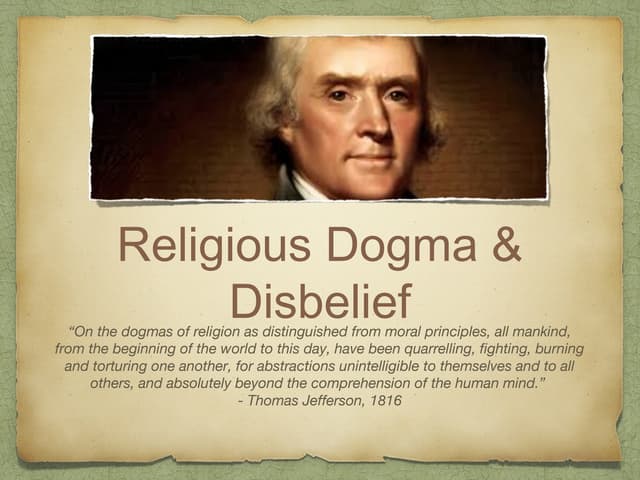
Metaphysics has acquired the widespread misconception that it is a form of philosophical thinking aimed at supporting dogmatic views, rather than questioning them. In other words, metaphysics today is conflated with dogma, which is unfortunate because it was originally designed to counter-check dogmatism. The dogmatist, in their rhetoric, conflates the term ‘metaphysics’ with ‘dogmatism.’ The very system intended to counter-check dogma is now associated with it, allowing the dogmatist to go unchecked—something they ultimately rely on in order to make ungrounded claims. It makes sense that a dogmatism would seek to eliminate any fact-checking system to maintain its falsities without being questioned. This misconception has persisted in the minds of ordinary people, who no longer define metaphysics as scientific but instead view it as mysticism.
Metaphysics was originally created to check false claims about the universe because it is the primary science that requires a logical basis for truth. Dogmatism corrupts metaphysics because it seeks to make its claims immune to logical scrutiny. Academics today are in disagreement about whether logic is universal or artificial. If logic is artificial, they can create their own man-made systems of verification to maintain their dogma. However, if logic is universal, then it is an organic system discovered by mankind, and humans must answer to a rationality that exists outside themselves, rather than relying solely on their own reasoning. If universal logic does not exist, then their facts can go unchecked.
Ironically, it is the very reference to outside rules and laws that the dogmatist claims to be ‘objective’ that they use to justify their subjective claims. Historically, dogmatic religious thinkers have referred to God to justify what would otherwise be inhumane actions. They make knowledge of God the absolute principle ‘beyond’ the mind. The combination of ‘absolute’ (which cannot be questioned) and ‘inaccessible to the mind’ (beyond comprehension) is the fatal mark of dogmatism. That is, God is made the limit of thinking. The subjective opinion is disguised as an objective truth with ‘no’ inherent truth other than personal gain, because God is said to be interpreted only through personal understanding.
Monotheistic religions have attempted to make an objective claim about God, but in doing so, they have made God the objective limit of knowledge. Consequently, any notion about God is merely a limited interpretation based on an individual’s finite understanding. In other words, God can no longer necessarily be said to exist if all our notions about Him are just interpretations of something we cannot absolutely conceive, yet at the same time, we are conceptions of this being.
Error of Idealism in Empiricism

If truth depends on the objects outside the mind, and not the mind “inside” the object, then the conclusion is that; whatever the “subject” (the being) perceives constitutes the absolute basis for truth. In other words, truth is subjective. The latter claim, as we repeatedly show, has many issues when considered as an absolute ontological principle.
The kind of logic that empirical science purports to have requires the negative connotation associated with idealism. The mischaracterization of what metaphysics is – a straw man argument. What empirical science fails to realize is that they completely misunderstand idealism, reflecting their own biases as truth.
This kind of logic fails when it confuses the property of empiricism by applying it to the nature of idealism. Looking at an object and then concluding that whatever is observed is the indubitable fact about it; is the same narrow thinking as the opposite claim, which states that any form of thinking is true by virtue of it being thought of, that is, whatever I think, is true. The empiricist says that the latter does not hold up like the former, so the field of idealism is erroneous. However, this supposed error in idealism is, in fact, the blind spot of their own error, which they fail to acknowledge.
The standard of empiricism is used as a measure to claim that idealism is false, but this so-called “false” aspect of idealism is precisely the problem with empiricism. In the most basic terms, the common initiation goes like this: “It is what it is”—which is counteracted by the other equally viable initiation: “Nothing is what it seems.” Both of these are equally incomplete, coming from two opposite perspectives. They are initiations because both make an affirmation of something positively being there, 1) “It is what it is,” which affirms that something undeniably exists in a certain way, and its opposite, 2)“Nothing is what it seems,” which affirms that reality is ultimately deceptive or unknowable. Both of these affirmations make a positive claim about the nature of reality, yet they are equally incomplete, each coming from a different end of the spectrum.
The problem is that every science thinks they are dealing with different types of substances because they believe there is only one fundamental substance, and anything else is secondary to it. For example, materialists say that matter composes all things, while mathematicians say that numbers are the root of all things, and philosophers say that mind (Reason) is the universal substance. They are all right, but not in the same way. In other words, they are right, but not in the same order. Philosophy is more fundamentally right than all other forms of thought because, first, you need to establish a correct ontology, i.e., worldview, before you can understand anything in the world and the facts about it.
Anselm’s “God” Argument (part 1)
Anselm’s ontological argument for “God” serves as one fundamental example of the misapplication of metaphysics. The argument follows as such:
“God is a being than which none greater can be imagined. A being that necessarily exists in reality is greater than a being that does not necessarily exist.”
If you can imagine God, then by definition, He is NOT the greatest because He is less than the being that imagines Him. The ability of a lesser being (in this case, the human) to imagine God means that the lesser being would be greater than God, who is being imagined. If a being less than God can imagine Him, this would make God NOT all-powerful, but a fallible being. The second part of the argument is crucial because it suggests that God is not only a being imagined by humans, but also exists in reality outside of them.
The assumption is especially interesting because of its use of “inverse logic,” where the conclusions are presupposed in the beginning of the argument as the first premise, so that the premises leading to the conclusion will make it true. The first part of the argument leaves ambiguous whether God exists only in the imagination of the human or whether God exists outside of the human mind. Yet, it still concludes that God cannot be ultimate if He is only confined to the human mind. Therefore, God must exist outside of reality in order to be truly labeled ultimate.
The conclusion is that God is never only in the mind of humans, but exists in reality. Since what exists in reality is more “real” than what does not exist in reality, God is only real if He exists outside of the human mind, and not real if He exists only within the human mind. The argument is, in fact, ingenious because it utilizes the essence of logic as a system of structures and order, rather than focusing on content or meaning. The placement of God within the human mind, as opposed to God existing in reality outside of any mind, is a valid logical structure. This is because both presuppositions—reality and the human mind—are assumed beforehand as invariably true, and the conclusion follows logically from them.
God is presupposed as the ultimate principle. Whatever that ultimate principle may be, it is named God, and if its nature is true by definition as being ultimate, nothing else can surpass or contain it. The presupposition that God is ultimate is a principle grounded on the fact that there is always an ultimate principle. Whether we know its finite nature or not is a separate question from maintaining the necessity of an ultimate principle in relation to finite variables.
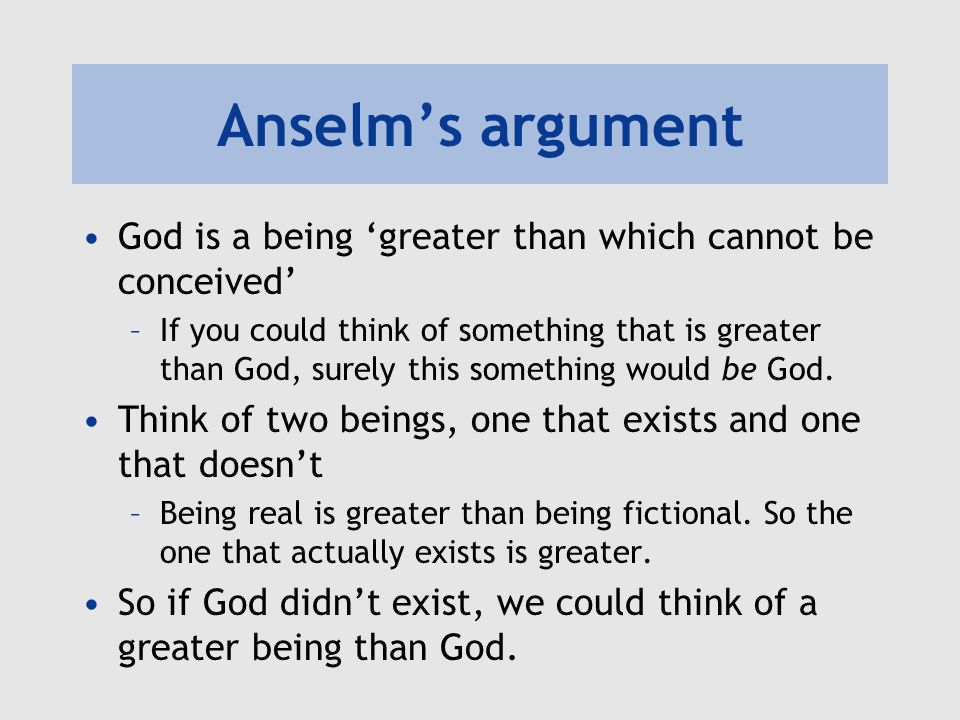
Anselm’s argument is Secretly Materialist (part 2)
The argument relies on the claim that: (1) God is a being than which none greater can be imagined, and (2) God cannot be fully accessed by the intellectual powers of humans. This argument presumes that God is an invariable part of the mind, as it serves as the limit of knowledge. At the same time, it is independent of the mind due to the very limitation of human thought to access it. While God exists in the mind, He also invariably exists in reality “outside” the mind, because we say God is an independent being who serves as the “ideal” of nature, possessing absolute power, matter, and energy.
The logic follows that, if something can be conceived in the mind, it must first already exist in reality outside the mind. This line of thinking implicitly presents materialism disguised as idealism. God contains the entire content of the universe and the “more” potential beyond it. This abstractionism leads to the same infinite regress problem that materialism suffers from: beyond a certain point—call it “God” or “singularity”—there is redundancy in the recurrence of the same unknown variable multiplied beyond a measure. There is always “more” of matter to discover, or “God” becomes that one aspect we can never fully uncover. This is the negative of the positive affirmation in Anselm’s argument for God, which states:
“A being that necessarily exists in reality is ‘greater’ than a being that does not necessarily exist.”
The assumption is that humans do not necessarily need to exist for the universe to continue existing, whereas God must necessarily exist for the universe to be conceived. This latter point can be interpreted to mean that, although individual consciousness or a limited mind may not necessarily need to exist for reality to continue, the opposite must necessarily be true: consciousness or mind, in the absolute sense, must necessarily exist for the world to “be,” because the existence of the universe depends on an observer, be finite or ultimate, one or the other. According to quantum science, the observer phenomenon is indivisible from any material cause. At the fundamental level, even of matter, there must be an instrument of observation, a substance of mind, that must be present in order for the physical phenomena to unfold and take on a sequence of events that describes its mechanics.
The key term in this proposition is “necessarily,” because God is assumed to necessarily exist due to the fact that the entire universe depends on God—the universe being a “conception” from God. The universe as a “conception” of God means two things: (1) God “conceives” the world mentally because conception is the mental phenomenon of creating or “realizing” something into being i.e., consuming the object from the outside into the inside of the mind, and (2) “conception” more generally refers to the actual generation of an object into physical being. The reason for the latter claim is that the human mind is limited to the information it receives from the outside; it cannot go beyond the data it receives. In other words, it can only receive from the outside, and the assumption is that it cannot generate its own data into being. If it does generate its own data, then that truth is also limited because there is more information it did not fully access from the outside, but it only receives what it can to form the picture of reality, a resolution to the complex problem.
Once the notion of God is conceived in the mind, a more perfect notion of God exists outside the mind. This results in a conceptual infinite regress regarding the notion of God: whenever a subjective understanding of God is achieved, a more perfect objective understanding always exists. Once the notion of God is attained, it is no longer perfect. This makes the mind always fall short—always imperfect—because it either cannot keep up with the infinite matter outside of it, or it cannot keep up with its own substance, a greater version of itself, God that it cannot conceive. The subjective and the objective do not bear a direct relationship with this logic, or if they do, their relationship is merely this: the subjective is flawed, and the objective is true. The separation between them constitutes their relation. This fails to conceive how the subjective is the expression of the objective, which is the very predisposition to the notion of ‘man as created by God’ in the Bible.

Solipsism
If the principles of solipsism are carried to the extreme, it would present a problem for Anselm’s argument.
Solipsism is the opposite view of Anselm’s argument for God. It assumes the opposite—that there is no God, and only the “self” constitutes ultimate reality. Let’s explore how this is false, or in concrete terms, an illusion.
Anselm’s argument conceives the existence of God by claiming that because God exists in the mind, God must also exist in reality. This excludes the predicate of such thinking: that because God exists in reality, God must also necessarily exist in the mind. The existence of God does not first have its place in reality; rather, the existence of God derives its reality by existing in the mind. The notion that ‘something’ is the way it is because “it” exists in the mind can lead to a kind of intellectual psychosis, where the thinker assumes that whatever he “thinks of” will manifest in reality simply by virtue of being thought. This can resemble a type of paranoid personality disorder.
Solipsism takes whatever is “true” in the mind to be invariably “true” in reality “outside” the mind. It is based on the assumption that whatever is “seen” in reality is also invariably an existence enclosed by the mind. The mind encloses reality wherever it perceives it, therefore “where” is the reality independent of the mind that encloses it? Without the mind that perceives (or conceives) the world, the world would not be known. Therefore, wherever there is reality, you must also presuppose the mind as an indivisible principle from reality.
Reality outside the mind depends on the mind that conceives it. From this indivisible relationship between mind and reality, solipsism makes the further crude (extreme) conclusion: Since the world depends on the mind in order to be perceived, the world would not exist if it were not perceived by the mind. Therefore, whatever the mind perceives must be reality. The latter is the problematic conclusion.
The essence of solipsism is logically true; it is only the later finite conclusions it makes that become erroneous. Unlike Anselm’s argument for God, the conclusions following solipsism’s premises are not universally true because the first presupposition is that the mind is ultimate. In contrast, Anselm’s argument presupposes that God is ultimate. For solipsism, the mind is not ultimate, but rather fallible and finite. Therefore, not everything the mind conceives in reality is automatically real. There is a fundamental contradiction in solipsism that is not necessarily present in Anselm’s argument. Namely, God is ultimate, while the mind is not. For solipsism the mind is ultimate but there is no God?
God is the essence of mind, namely, mind has an aspect of it that is ultimate, but as a concept it is also finite. However, God the ultimate aspect of mind, cannot inherently be finite, but must be inherently unlimited, it cannot be accessed by mind that is limited. God is that one aspect that is not accessed by mind, yet must logically and necessarily be true, even for mind. The next question is: when can we presuppose that the mind is ultimate? We know the mind cannot truly be ultimate, as it is fallible and finite in its observations of the world, but when can the mind be considered ultimate? Or, in other words, what aspect of the mind is ultimate that justifies its indivisible place in relation to the world, such that reality depends on it?
Solipsism does find value in the quantum sciences if we claim it as an epistemological position. As an epistemology that is not divorced from a proper ontology (metaphysics), solipsism makes two distinct yet contradictory points: (a) anything outside one’s own mind is “unsure,” and (b) the external world and other minds cannot be known and might not exist outside the mind. The fact that reality outside the viewpoint of one’s own mind is uncertain does not necessarily mean that it does not exist or possess its own self-subsisting existence. In fact, in materialist ontology, it is assumed that all objects are entirely distinct and separate units with their own identities, holding their own ground against each other.
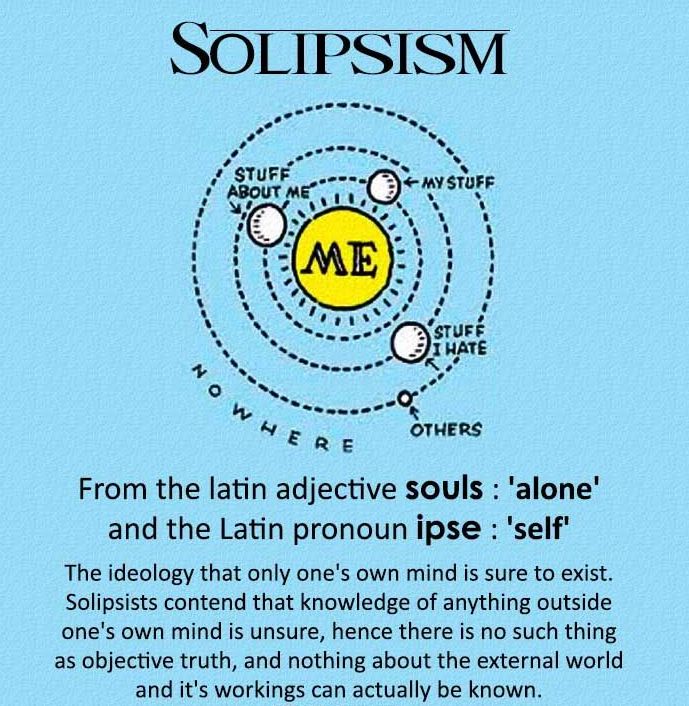
Euthyphro Dilemma
Metaphysics inquires into the fundamental nature of things precisely to break away from this (solipsism) kind of logic. The Ancient Greek tradition, for instance, was among the first to apply metaphysics in a scientific form, seeking to understand the fundamental nature of the object rather than just what is said about it. This is where the scientific predisposition toward metaphysics began, prior to its later theological misapprehensions.
Aristotle defines metaphysics as the “first philosophy,” dealing with the fundamental principles of nature. Ontology, a branch of metaphysics, deals with abstract principles such as Being, Substance, time, space, etc. Socrates’ condemnation to death was precisely due to his questioning of the primary nature of God. Socrates commits the blasphemy that Anselm’s paradox addresses—a paradox that presents an impossibility, one that cannot be committed even if one tries. However, for the state, they punish the questioning of God. The pragmatic consequences of the theoretical. For Socrates, he was attempting to achieve the impossible, the discovery of God, which ultimately caused him killed. For example, in the Euthyphro, the dilemma is paraphrased by Plato as follows:
“Is that which is holy loved by the gods because it is holy, or is it holy because it is loved by the gods?”
In other words: (1) Is the Good… the Good… because God said it is Good? Or (2) because it is the Good, God said it is the Good? The latter presupposes that the Good is outside and independent of God, and therefore there is something higher than God, which God only applies. In this case, God loses his value as the ultimate principle of the world. God is not the absolute principle if something is higher than Him.
The first point makes God the standard of the Good because whatever ‘He’ commands is the Good. If the first part of the dilemma is true, then the Good can be any arbitrary measure made by God, and therefore there is no real standard to say something is good or not, other than the arbitrary command of God. If the second part of the dilemma is true, then there is no God, because there is a standard higher than Him—i.e., the Good—and there is also no ultimate standard of the Good because it has lost its absolute or universal force of execution, i.e., God. The impossibility is that, God is without the Good, and the Good is without God.
The solution to this age-old dilemma is somewhat solved by the Christian tradition with the notion of the “Trinity” — the “Father,” the “Son,” and the “Holy Spirit.” The Trinity, in its essence, argues that God is a threefold substance: (1) God the “Father” is a figurative abstract, a potential, or an ideal; (2) God as Christ is concrete matter, flesh, and a finite individual body; and (3) God as the Holy Spirit is the translation between the abstract and concrete, the ghost, spirit, or ether that holds extreme opposites together into a unifying form. The relation between God and man is spirit (classically translated as mind).
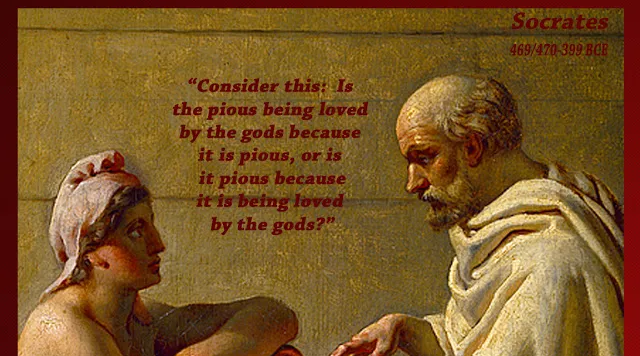
Idealistic
The abstract notions of ontology are often identified by empirical science as idealistic or belonging to idealism. Scientific materialism argues that “abstract notions” exclude the nature of ‘physical reality’ and that their existence is unrealistic because they do not possess “concrete reality.” However, this definition of “concrete” reality excludes its own abstract notion, which makes sense of it.
Ironically, materialism, in trying to provide a concrete basis for everything, provides the most abstract notion of all: “matter”. There is no such thing as “matter” existing independently as a substance external from the objects that are identified as “material.” Matter, in other words, is a wholly abstract notion on its own and does not exist as a single substance. Rather, matter is a generalization of things that are alike in their capacity to be observed (or sensed) by the observer. Matter is an aggregate collection (aggregation) of related qualities for an observer.
Empirical science seems to understand Metaphysics in the same way it is defined by religious thinking. Just as religion defines metaphysics, empiricism views it in the same way. It is easy to claim that abstract notions possess no concrete reality because that serves as justification for not inquiring into the nature of them—precisely the kind of justification that is valid for empirical thinking.
The vulgar materialist possesses the following logic: because first principles possess no immediate concrete reality, i.e., they are not objects, they are wholly theoretical and abstract, and therefore do not exist apart from the objects we directly observe. The objects we directly observe are the only “true” foundation for existence, according to materialism, and they should only be explored to the extent that they can be sensed. Even if they can be “thought” of (sensed by the mind), that is not enough criteria to constitute them having reality.
Empiricism justifies not dealing with thoughts as objects, focusing only on things that are immediate for sense perception. This intellectual shortcut is adopted by empirical science. The nature of first principles is difficult to understand because they are the furthest substance from the senses. This means they can only be grasped by so-called “abstract” or “theoretical” thinking. Theoretical thinking is however a physical endeavour, but it is not sensed.
The idea that first principles are theoretical is not a problem in-and-of-itself. The empiricist argues that they are defects because they are not observable by sense perception. Yet in every science, finite “numbers” are purely abstract; however, they constitute a true representation of all physical objects. The true problem with empiricism is that it lacks the foundational truth of idealism, which is that the fundamentally true nature of the objects observable by sense perception is that they are inherently “abstract models” of the Form they exhibit. This Form, whether abstract or not, is not answered by the representation of objects, but we must find the original source of the representations that present themselves as immediately real.
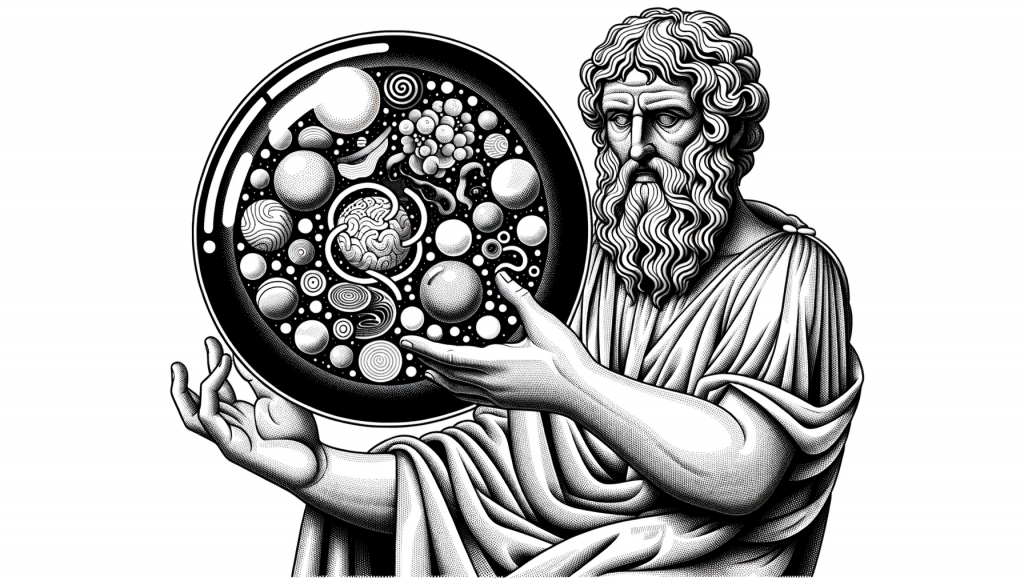
Concrete Principles
First principles are precisely meant to be “difficult” because they grasp the nature of total reality, which sense perception can only capture in a limited way. The assertion that first principles do not possess “concrete reality” because they are not perceived as objects that are “normally” perceived falls into a theoretical error, failing to properly associate first principles with the principle of the concrete (the fallacy of misplaced concreteness). How is the concrete nature of reality a first principle? In other words, what is the first principle of being “concrete”?
The “fallacy of misplaced concreteness” happens when the thinker commits the error of confusing the nature of the concrete. This fallacy, which we explore more deeply in other sections, assumes that the “concrete” is only “real” when it is separate and constitutes a more fundamental position in reality than the abstract, which is said to be elusive, theoretical, and unreal. The correct remedy to this fallacy is to find the abstract in the concrete, or how the abstract itself constitutes a concrete basis for reality. Where he places the principle of the concrete is the area where the error occurs. If for example, he says that all matter is concrete because the concrete is matter, then he commits the fallacy by presupposing the conclusion prior to the premises. The fallacy does not make the conclusion into a premise, and therefore the conclusions cannot be stated, as they do not achieve a truth outside of the original presumption.
A part of this scientific fallacy is the mindset that places ‘no belief’ in the universe bearing “Reason” outside the human mind. In other words, the world “out there” is random and chaotic, while the mind “in here” is rational and ordered because it makes sense of what is otherwise incoherent. This common-sense proverb has twisted and confused the placement of true reality. The inverse is equally true: the mind within us is chaotic and unpredictable, but the world “outside” the mind, according to elementary mechanics, exhibits a definite and predictable set of determined interactions.

“Fear of falling into error”
Not believing in the “Reason in the world” is induced by a “fear of falling into error,” which introduces a distrust into science. According to Hegel, the “fear of error is the initial error… and is the fear of truth…” (Mind 28-29). Hegel writes:
“Meanwhile, if concern about falling into error injects a mistrust into science, which, without any such misgivings, gets on with the job itself and actually cognizes, it is hard to see why we should not, conversely, inject a mistrust into this mistrust and be concerned that this fear of erring is really the error itself. In fact, this fear presupposes something, a great deal in fact, as truth, and it supports its misgivings and inferences on what itself needs to be examined first to see if it is truth. That is to say, it presupposes representations of cognition as an instrument and medium, also a distinction between ourselves and this cognition; but above all, it presupposes that the absolute stands on one side and cognition on the other side, for itself and separated from the absolute, and yet is something real or, to put it bluntly, it presupposes that cognition which, since it is outside the absolute, is surely outside the truth as well, is nevertheless genuine—an assumption whereby what calls itself fear of error stands exposed rather as fear of truth.” (Phenomenology of Spirit 74)
Ignoring the importance of first principles is detrimental to the very task of empirical science itself. Once the set of concrete facts are derived about any particular phenomenon in the universe, what do these facts pertain to? What nature of reality do they reveal? What is the relationship between the particular facts about nature and ultimate reality?
Empirical science fails to deal with first principles. It will simply claim that empirical facts are either true in-and-of-themselves or are true in terms of their particular “external relations.” These sets of empirical facts are true in terms of the phenomenon as it appears, not as it is in and of itself. The distinction here is that there is always something in the phenomenon that does not appear.
The facts about external relations produce their own ontology. It is the ontology that sees nature as nothing else than what it “appears” to be. True facts about a particular natural phenomenon, however, only indicate that such facts pertain to the phenomenon, rather than explaining what the phenomenon is. The definition still does not target something independently true outside of its relations.
The task of empirical science is to derive the infinite set of facts without the purpose of their knowledge, or only knowledge of them without purpose. The failure to apply first principles in relation to facts does not mean that each set of particular facts must immediately be related to the utmost general and universal principles of Being. Rather, there are first principles implied in each and every particular fact about a specific topic.

Obeying a Formal System
Academics usually claim that “reasoning” is correct when it is consistent with a formal system.
A “formal system” is a composed, manufactured way of thinking; ready-made so that the maximum number of people can apprehend it. Formal systems are usually consistent with common sense or with what our natural organs of sensation provide as ordinary experience. What we mean by “ordinary experience” is consistent with a mechanical way of doing something without the need to reflect on it. As they say in the office, “crunching numbers” describes a repetitive and mechanical human activity. In this activity, the individual has to entirely rely on and obey a formal system.
In order to achieve knowledge of how particular facts relate to the most universal principles, knowledge about the “first principles” concerning the facts themselves must be achieved. To this extent, it is important to understand the true definition of “idealism” (Science of Logic, 48). Hegel, for example, is misunderstood as an “idealist” because he is widely criticized for his “informal” writing style.
Academics claim that nobody “understands” Hegel, and therefore, if his way of delivery is flawed, then he has nothing truly valuable to say. However, Hegel is only “difficult” to understand because he is employing an informal way of thinking, a different system of logic NOT commonly shared by most people. He is NOT formal, but being formal does not necessarily mean being correct. Hegel lays out a series of contradictions that lead to valid conclusions. We are both the medium and instrument of the thought process because we use it and then deliver through it.
It is actually the formal system of logic that inverts the natural way of thinking, i.e., informal logic, and claims that the opposite of the truth is, in fact, the truth. The natural way of thinking is always informal because it does not conform to a specific, confined system of abstracting the world. But this does not mean that there is no objective system for understanding the world, nor does it mean that each individual’s subjective system of understanding the world is equally true in depicting the objective nature of the world.

How to Misinterpret a Philosophical Work
People usually misunderstand a work of philosophy based on the following mistakes. Common mistakes take the form of: 1) individuals who have NOT read the work and are talking about what they think (“assume”) the work is about; 2) they get their understanding of the work from others, who already have a biased opinion about the work; 3) those who have read only parts of the work that they want to read, or the sections that seem to tailor to their already preconceived opinions about what they think the work is about; and 4) lastly, they “cherry-pick” passages that are taken out of context so they can show the whole of the work is flawed. All these instances are variations of “straw-man” fallacies implemented against the philosophical work.
The reason why it is especially important to read a philosophical work in “full” is because, over time, the reader will recognize the dialogue the philosopher has with his own mind. Hegel’s notion is metaphysical because it is grounded in abstract truth, so as to develop the theoretical; whereas empirical science is the elaborative stage after that, which applies the theoretical to produce the concrete. The materialist claim that by beginning with the concrete, they possess a concrete principle. However, any true philosopher (or scientist) knows that the first concrete principle is the abstract. The abstract is the first true notion of the concrete because it is proven theoretically, and it is this fact that constitutes the reality of empiricism, which it does not dispense with.
Where does empirical science derive its theoretical methodological system if NOT from the place where such a system already produces the concrete? Empirical science derives its formal system of logic from an already informally conceived system of logic. But because it is informal, it does not receive the same “fame and recognition” as the constructed and furnished formal system of logic. But just because it is not recognized with the same fame does not mean it lacks existence as the predicate. It cannot forget, nor operate as itself, without its predicate, without the very source of its theoretical truth, which has already been derived from the concrete. According to Hegel, every science is itself idealistic… (Science of Logic).
Beyond Sense
The point of stepping beyond the “mundane” is to recognize that even the natural organs of the understanding do not arrive at truth through standard methods of “correct” reasoning. Our sense organs perceive an “ordinary” world by filtering out aspects of nature. For example, vision limits the world to discrete moments of abstractions that characterize a more general relation (or happening). Touch, on the other hand, focuses sensation on a localized spot. You never feel the total surface area of an object, but only specific areas (sections) of it. No matter how large or small the object is, touch can only “feel” the localization of a surface area within a “general” field, which exists beyond the reference frame of the observer (beyond the faculty of touch). Sight, similarly, can only perceive the general outline of that surface area, not its complete depth—such as the radiations of light, the speeds of energy, or the complete gradients in material.
Ultraviolet radiation has a wavelength shorter than that of the violet end of the visible spectrum, and cannot be observed by the faculty of perception without the aid of instruments. Yet, color is naturally perceived, and the sense of touch can independently detect heat from light. Ultraviolet radiation is a fundamental source in nature for both color and heat. Our senses detect heat or color independently through their specialized faculties and claim that each originates from its respective source. However, in truth, both of these senses are derived from the same fundamental source.
The zeroth law of thermodynamics states: “If two systems are each in thermal equilibrium with a third, they are also in thermal equilibrium with each other.” This is essentially a logical rule: if heat and light are distinct forms of energy, they are still interconnected. That is, you can derive heat from light and light from heat. In fact, both heat and light are fundamentally forms of motion. For example, in atomic theory, heat is simply the result of atoms being stimulated by friction, causing them to move rapidly in place. But the establishments of both heat and light need to be explained from their informal side, which cannot simply be accepted as readily available knowledge. Why, for example, do rapidly moving atoms at a constant rate produce a felt phenomenon like fire? This question goes deeper than what science can explain. Why does fire appear as a red, wave-like stream? The physical explanation is different from the subjective, felt experience.

True facts that belong to improper Ontology
1.7 “Proper” Ontology
The difference between “proper” and “improper” ontology is not a matter of distinguishing between what is true and what is untrue. In other words, both truths are not equal. The fact that different opinions can be true is true only in the sense that they both exist. However, the second fact—the nature of their existence—determines their inequality. The “equality” between ideas does not imply that they are equal members of the same quantity; rather, their quality defines how one is above the other. This should not be taken in an ethical sense—i.e., one person being superior to another. Although, even within the human domain, we observe a hierarchy, where people are structured in a systemic chain, with some being superior in terms of class, body, mind, genetics, etc. Any of these qualities exhibit such variations in degree that they result in an unequal distribution of individuals across the species.
The species is the actual distribution, the substrate spread across an aggregate of spacetime known as “the planet.” Beyond this macroscopic sphere is an internalized, microscopic dimension, extended infinitesimally to disclose experiences we identify as “abstract” (like atoms) or “thought”. How does Being restore itself after falling short of itself, missing itself into death, which is the moment of non-actuality for the being. However, Being continues after this opposite moment of itself. Being is absolute; it rediscovers itself always in order to maintain the meaning of being rather than not-being. Hegel explains below the transition from Death to Being.
“Death, if that is what we want to call this non-actuality, is the most dreadful thing, and to hold fast to what is dead requires the greatest force. Beauty without force hates the understanding because the understanding expects this of her when she cannot do it. But the life of the spirit is not the life that shrinks from death and keeps clear of devastation; it is the life that endures death and preserves itself in it. Spirit gains its truth only when, in absolute disintegration, it finds itself. It is this power, not as the positive which averts its eyes from the negative, as when we say of something that it is nothing or false, and then, finished with it, turn away and pass on to something else; spirit is this power only by looking the negative in the face and by dwelling on it. Dwelling on the negative is the magic force that converts it into Being.”
The difference between “proper ontology” and “improper ontology” is not in the “content” of thought but in the way of thinking—the form of thought. We cannot assume that gathering a bunch of correct facts and calling this process truth is sufficient. There must first be a true presupposition, which is the conclusion that these gathered facts prove. In other words, the facts must be “saying something,” pointing to a worldview. The worldview makes sense of the facts; otherwise, they remain empty abstractions. The intent behind the facts is what determines a proper ontology.

Necessary vs Probable Conclusion
What makes an ontology ‘false’ is different from what makes other forms of knowledge false. For example, in analytical knowledge, a fact can be false, but the belief or worldview may still be correct. Conversely, if the worldview is false, correct facts cannot belong to it because they would be inherently inconsistent or misused. The worldview is the foundation upon which truth follows; it guides the facts toward rational conclusions and has therefore a moral principle. By “rational,” I mean “that which makes sense”—it can be deduced logically, i.e., it can be made sense of.
Aristotle says that anything we know is scientifically true when the “necessary conclusion is just as certain as its premises, while a probable conclusion is somewhat less so.” For example, we can scientifically know that the three internal angles of a triangle add up to two right angles. This fact is characteristic of technical knowledge found in analytical truth and is either the case or not—it is necessarily true, and cannot be other than what it is in order to remain itself. The opposite, which is “probable” truth, can include two contradictory facts existing together at the same time. These logical “rules” are also observable in nature, which is a rational system.
The dimensional degree of reality is determined by deductive as opposed to inductive reasoning. In the deductive sense, we must deduce (arrive at) reality on a microscopic scale. The microscopic scale is arrived at by deduction, assuming that if reality on a macro scale is necessarily true (by direct perception), then the microscopic scale is also true by its indirect relation to that former fact—i.e., from General to Particular (specific). We arrive at the microscopic, infinitesimal (minute) state of time through the macroscopic scale of reality. For example, from the generality of spacetime, at the most infinite scale, everything is revealed to us as minute points in spacetime.
Conversely, if we “induce” reality by way of inductive reasoning, we are presupposing the following: If ‘from the particular to the general’ means the higher you go out into space, the larger the scale becomes, then the larger the scale, the more “probable” reality becomes. In other words, reality becomes more “probabilistic” at the infinite scales, which also means infinitesimal. The more “probability” we observe, the further we go into both the most macroscopic and the most minute and infinitesimal scales. For example, as we go further into the subatomic state, we notice that particles of light are coming in and out of existence at an unpredictable rate, such that we cannot discern when one moment disappears into nothing or reappears into being. A similar situation occurs when we observe outer space and realize that no object in space truly occupies the position it is observed in. In outer space, the measure is “lightyears” because the realm is a place of time. Things are constantly changing, have changed, and will change. In other words, things that existed in the past may still appear to exist for the observer in the present. For example, when we look at certain stars or supernovas lightyears away, they may no longer be alive, but we can still observe their light remnants from our position.

Predictable vs Unpredictable
In a biochemical sense, we cannot predetermine whether a life-form is conceived into birth, or deceased out of being, or when the composition of one chemical occurs over another, causing a chain of reactions known as metabolic activity—the activity of living. Birth and death are only observed at the normal state of perception. At more imperceptible dimensions of reality, the being or non-being of any given event is unknown because it is unknown generally in reality—i.e., it has not yet happened, or has already happened, or it does not matter. Ontology, however, is more fundamentally an ethical kind of knowledge, which takes technical facts and uses them to draw conclusions—or rather, to make a judgment about a certain situation.
Ontological knowledge concerns the facts of ethics. An example of an ethical fact is that mammals give birth to their offspring alive. The fact about triangles is always true, but the fact about mammals is only sometimes true. However, ontology springs into action when confronted with the question: how do we confirm the relationship between technical and ethical truths?
The post-modern ontological stance argues that because ethical facts involve uncertainty, there is ‘no’ absolute truth. Arising from this foundation is a peculiar version of itself: the purely technical sciences adopt an inherent post-modern tone when they disregard ontology generally, and cling to purely “practical” knowledge. The true route of ontology looks at the uncertainty underpinning ethical truth, and makes the objective conclusion that ethics is inherently more uncertain than technical truth.
The uncertainty in ethical truth is itself a truth, one that involves more complexity. The complexity of one form of knowledge is solved with the other, and so, in the case of ethical truth, the fact might be uncertain—whether the child makes it out alive—but it is certainly true that mammals give birth to their offspring either alive or dead, i.e., sometimes alive, sometimes dead.

“The fact could ‘not’ be other than it is”
Confronting the uncertainty of “ethical” truth is the first practical step because it opens the “proper grounds” to act on or decide what to do next with the newly realized knowledge. This is what Aristotle means by “the proper object of unqualified scientific knowledge is something which cannot be other than it is.” In other words, scientific knowledge is achieved when “the fact could not be other than it is.” This is similar to what Charles Peirce says: a scientific fact is already true whether you know it or not; your knowing of it is the self-conscious confrontation of it. Hegel elaborates:
“It is this becoming of science in general or of knowledge that this phenomenology of spirit presents. Knowledge, as it is initially, or the immediate spirit, is the lack of spirit, the sensory consciousness. To become authentic knowledge, or to generate the element of science, which is the pure concept of science itself, it has to work its way through a long course. This becoming, as it presents itself in its content and in the shapes emerging in it, will not be what one initially thinks of as an introduction to science for the unscientific consciousness; it will also be quite different from the foundation of science; at all events, it will be different from the enthusiasm which, like a shot from a pistol, begins immediately with absolute knowledge, and makes short work of other standpoints by declaring them unworthy of notice.” (Phenomenology of Spirit, p. 27)
The “demonstration” is NOT merely the illustration of the fact, but rather it must have true premises prior to the conclusion; that is, the premises must be known before knowing the conclusion. The “premise” is the ‘area’ of knowledge, which is the field of facts that the individual is confronted with. The “conclusion” is the definite point of determining these facts and organizing them into a certain view. An “opinion” is a conclusion without having considered the premise thoroughly; in other words, it is unsupported by any premises. An opinion becomes an ‘argument’ when the conclusion is treated as a premise, because it can be judged, argued for, and determined to be either sound or unsound, etc.
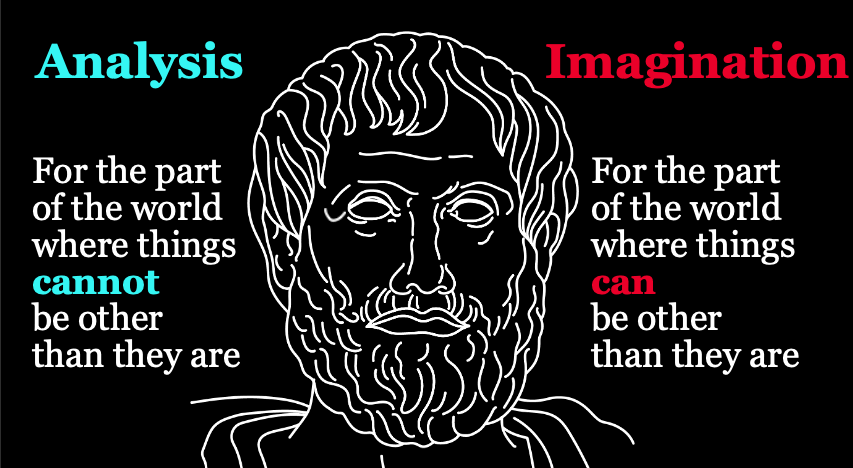
the 2nd condition of Science “Things that cannot be otherwise”
The second condition of scientific knowledge is that we know only the “things that cannot be otherwise.” For Aristotle, science is only able to process what is possibly true. It is impossible to think of not-something because, in doing so, you have thought of it. Any negation of a thought is just another thought. Try to think of nothing. For example, it is impossible to think of not-a-cat because that triggers the thought of a cat, and perhaps even the thought of a dog, and so on.
When Aristotle asserts that to gain scientific knowledge we must have the “cause” of the fact, he is claiming that we must know the reasons why the conclusion is true, even if we are certain of its truth. It is not enough just to ‘know’ something; you have to be able to demonstrate it.
The mistake in thinking, or the moment when an ontology becomes a false one, happens when the thinker fixates on a conclusion and finds comfort in that. This is the definition of “partial” knowing. We see this in the philosophy of David Hume, with the problem of induction. Hume raises the question of why we believe that the future will resemble the past. This is the same problem with unobserved things based on previous observations, such as the “rising sun”—the fallacy that the sun will rise every day.
The application of time presents a challenge to what is considered truth. The element of time changes phenomena in the sense that, first, things may no longer be true—that is, things may no longer exist—and second, even if phenomena are eternal, the observer must consistently rediscover them.
There may be many beliefs concerning the nature of an object, but there can only be relatively few true conceptions about what it actually is.
This is why you cannot simply take certain true facts from an incomplete theory and maintain the truth of the relationship between the facts and the theory. The instance when a false ontology uses correct facts does NOT provide a true worldview. This would be doing the very same thing that made the ontology improper in the first place: “complete” facts assumed to complete a partial worldview.
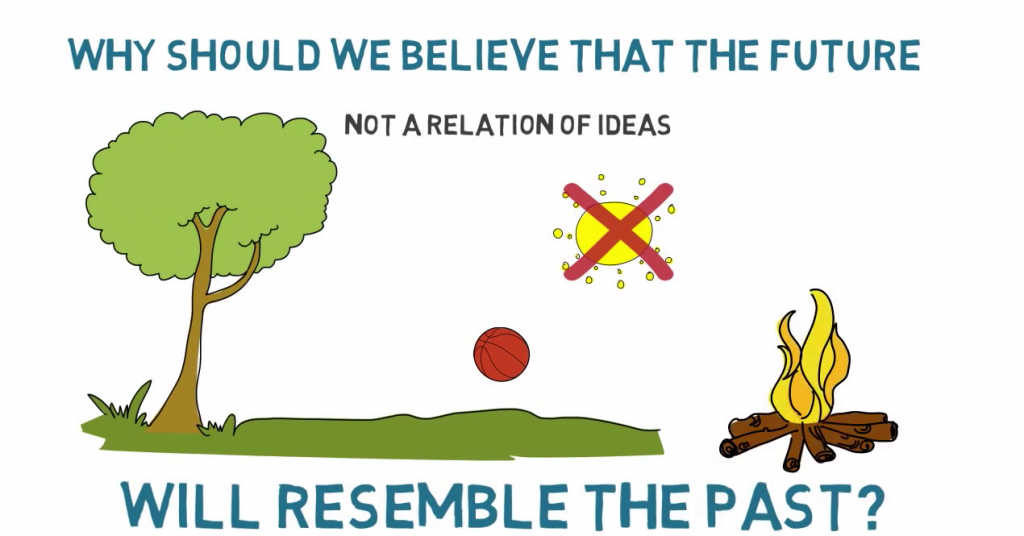
Worldview
A worldview is NOT a concept or a religious belief because these are what we mean by “completed,” ready-made ideas given to the public. A worldview is a natural and organic phenomenon of consciousness, allowing one to conceive a “picture” of the world. A so-called “pseudo-worldview” or “ready-made worldview” consists of ideologies about the complexities of the world that provide simple notions to satisfy our curiosities. However, with this “cure” comes the fallacies and falsities of “deep” and genuine illusion. These kinds of “worldviews” are provided to the general public so that they do NOT have to “think” for themselves. These constructed world “views” do NOT want individuals to activate their own self-reflective thinking, so they do NOT have to “think,” or produce, but simply consume a “belief” and passively accept how things are, without questioning the model of reality.
A “true” worldview is how you actually view the world if you used your mind and natural faculties of sensation to their full potential. The latter is how you “see” the world, and the former is how you conceive it, bringing the world into being. By “true,” I mean the organic way of seeing the world. Unfortunately, that is in-and-of-itself incomplete because it is identical with the level of development at which the individual is, during their life, and to which they are confined by nature. It is the individual’s uncertainty that decides what is good and what is bad. This immediacy is what we observe as “real time”—i.e., time that is NOT determined in a fixed way, but where determination is ongoing, and you must choose what is being determined into being. In physics, the idea of “real time” manifests as motion. The notion of existence “now,” in the present, happening right in front of the observer, exhibits itself as an object maintaining its same identity, even though it occupies different areas in the length of spacetime, i.e., motion.

Study of Ontology
The study of ontology does NOT merely accept what is prevalent among cultures or epochs, but rather examines how culture reacts to what a few “world-historical individuals” agreed and disagreed about. Ontology can be considered the true science of individuality, as it reflects on those few individuals in history whose uniqueness forms the foundation of our shared knowledge. It is the study of “individuals” by individuals because their lives and rational experiences shape our worldviews, and we only read about them once they are gone. They no longer exist, and therefore they have no ongoing bias. All their biases and opinions are portrayed in their fullness, and our judgment about them does not alter their views. The person is dead; they do not care nor are they affected by our judgment, and we cannot change anything about it.
We assume that “our” worldviews are unique to ourselves, but they are, in fact, the conceptions of others who are greater than us. We can say that our entire life events are the imagination of some other being determining reality from a different period in time—conceptions that disclose our own.
We are familiar with the common saying that ‘everything has already been said’; the whole of the truth is, on some level, already present, but the facts must be connected with the whole. Everything has already been said, but not everything has been said in every way, or rather, not everything is connected to everything.
Corruption of Epistemology
In academic settings, it is often NOT recommended, or moreover ill-advised, for philosophers to inquire into the concepts of physics. Concepts such as “quantum mechanics” are supposedly reserved for physicists because they possess the technical ability necessary for their understanding. However, this is a method contemporary academia uses to disassociate critical thinkers from accessing empirical facts contested as “undoubtedly” true. If philosophers were to enter the sciences, they would quickly learn that the so-called “objective” facts about nature we assume to be undoubtedly true are NOT as objectively certain as they are made out to be.
Ontology is an activity done for its own sake. This means that an individual will gain nothing externally from doing ontology, such as receiving money from selling an object. Doing ontology is the same as living life, or experiencing life, and communicating that experience in a universal manner—that is, in the scientific form it subsumes.
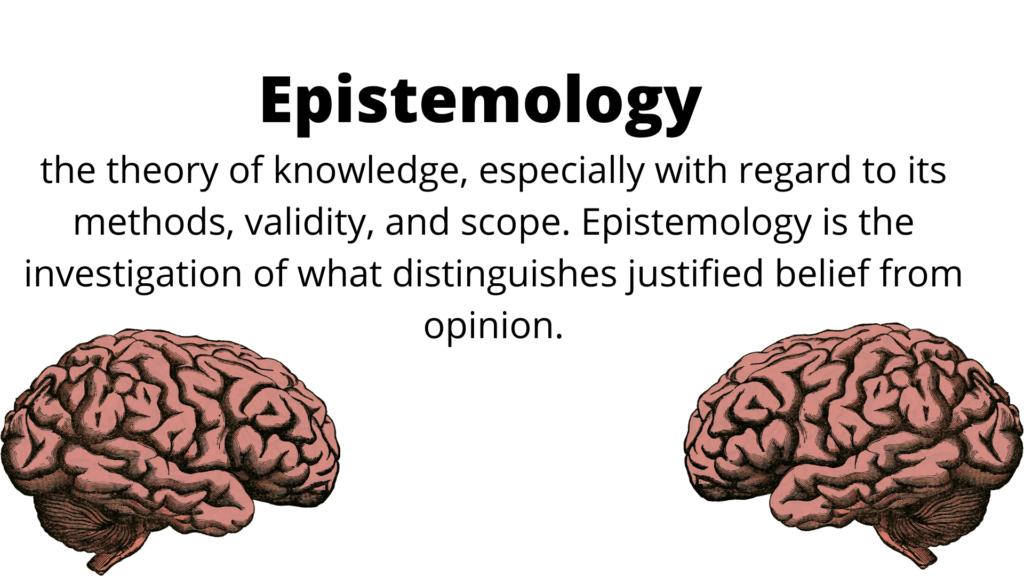
Opinion vs Justified belief
The difference between opinion and justified belief is actually NOT the truth, because both share the commonality of having no truth as the basis for their claims. Instead, they use factors “other” than the truth as the basis for judgments. This means that “opinion” literally refers to a judgment (view) NOT necessarily based on truth (fact), but rather on feeling or something else. On the other hand, justified belief is based on probable truth, but it remains uncertain. The physical scientists safeguard their facts against philosophers by emphasizing “specialized knowledge.” Modern academics no longer provide a general basis before branching off into specialized sciences; the relationship has now been inverted. In Ancient times, every scientist was first and foremost a philosopher, meaning their so called ‘specialized knowledge’ was the practical application and consequence from their general (theoretical) philosophy about the world.
Nowadays, philosophy is merely a topic among topics, with subordinate importance in the hierarchy of knowledge. It is a ‘class’ that everyone makes fun of and ‘no one’ takes seriously. This reputation of philosophy is artificially produced by modern academia to prevent thinkers from formulating a proper worldview, so they can simply employ the facts and theories given to them by their teachers. And remain ignorant of the ever-lasting truth.
War of Ideology
Beyond theory, the vulgar materialist, which are the post-modern equivalent of today’s “scientist,” wants the truth of the fact to be limited to what is perceived, and NOT to what is thought of beyond perception. Human perception is easier to manipulate than logic.
The faculty of understanding itself is being contested here, because while all the factual empirical proofs about nature can be found, how those facts are used to construct an ontology—a worldview about nature—is the concern of philosophy, which science depends on.
At the base of science, there is a war of ideologies; whose “view” of nature is adopted by the general consciousness determines the actual future conditions of nature itself. Ontology is NOT just a way of ‘seeing’ (viewing) the world; it is a way of determining the world. If epistemological inquiry takes thought to be the object of thinking, it must NOT simply apply thinking to its subject matter without applying the subject matter to thinking (Hegel’s general notions of logic). To make thinking subordinate to the subject matter means to accept the subject matter in the way it is given, without questioning, and to maintain this falsity by talking about it in the way that it is “meant” to be talked about.
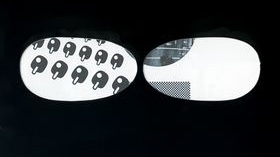
Contemporary Epistemologies
Contemporary epistemology does NOT want the subject-matter to be applied to thought itself, because “thought” is a free and questioning mechanism. True understanding will NOT simply restate what the subject-matter wants it to restate, but will question why it wants it to restate what it is requiring for it to restate. Thinking will wonder what the motive or intent behind the concept is. What is the intent behind the concept?
The empiricists who dominate epistemologies will argue that the concept has no motive; it is “impartial.” How can a fact about “rocks or magma” have a motive? They claim the fact “is what it is,” in other words, it cannot be attacked because it exists outside the “subject” making the truth. However, this epistemological principle is misused, causing the opposite of what it is intended to avoid. We don’t know whether the facts are true or not. The “facts” may NOT be true and may be used as true by individuals perpetuating a bias. They use this strategy to deflect the motives that the thinker himself has in using the facts for a definite purpose. In other words, the facts are always used to support or distort a particular narrative, worldview, or ontology.
In the epistemological logic, “thought” is argued to be separate from the object, and is assumed to be attributed to it from the outside. In this sense, the object portrays no concept of thought. The object is lifeless and exhibits a set of fixed peculiarities that thought observes. This is derived from a materialist ontology. The particular facts are always used to promote a general notion by wrapping them into a ready-made package capable of fitting the narrative they are pushing. The facts may not have a motive, but the scientist using those facts always does, whether for better or for worse.
However, the same epistemological thinking conceives the human being as an object that has rationality “within”, or rather, is capable of thought. But the objects themselves have no innate rationality. The rationality of the objects is given to them by their observer because the observer makes sense of them. The object and thought are separate, and the object is NOT the source of thought. Yet it is integral for there to be objective truth for the empirically minded, because there have to be “facts” that represent the object in and of itself, independently from anyone’s opinion of it. The materialist ontology does NOT unify these opposing principles of epistemology; it maintains them confused and opposed to coherency, so that the order in which the relation between reality and the observer can be engaged with is left up to arbitrary choice.
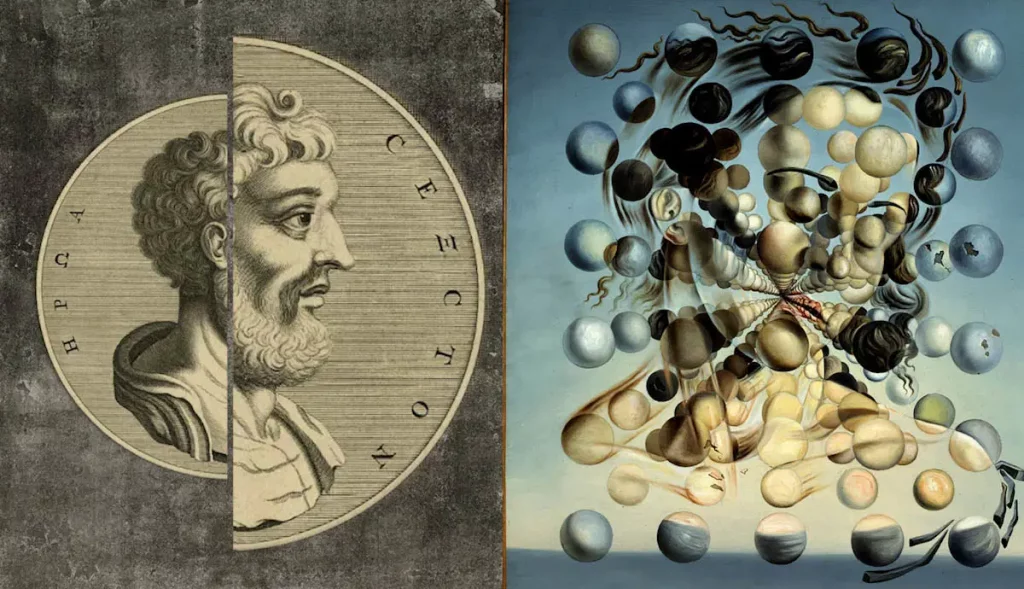
False Hypothesis
We do NOT have to go very far to see the necessity of metaphysics for epistemology because even the methodology of analytical thinking primarily involves hypotheses. A hypothesis is a speculative assumption that may or may not be true, made about the phenomenon before investigating whether it is true or not. When we say, “if it is true or not,” we mean whether the assumption made about the phenomenon prior to observation conforms with the phenomenon after the observation.
Metaphysics is ingrained in epistemology in such a way that the only real question a serious scientist must ask is: What kind of ontology am I going to hold in determining my epistemology? Science is a matter of figuring out the true ontology by seeing how the world confirms to belief. The task of choosing the ontology is the importance of philosophy.
In present Modern times, it is argued that science is not motivated by ideology, and that science is “free” from a motive, being neutral to the facts. This method secretly perpetuates an ideology in science by suggesting that science is free from a motive, free from some kind of worldview, and that science is not trying to prove a particular worldview. Instead, it is suggested that a worldview is a residual consequence arising from the findings derived from nature by way of its “impartial” methodology. This strategy in modern science is used as a way to confirm that their ideology is true because it is naturally arrived at by simply “following the data.” It cannot be argued against because it is “what the facts state,” and to go against it means to be a bigot, going against so-called “concrete” facts. The ideologues of science use this argumentation to shut down and counteract the critique that any science is motivated by a hypothesis it is aiming to prove, claiming that “our science” is not motivated by anything prior. When their motive is this very fact, to escape a motive.
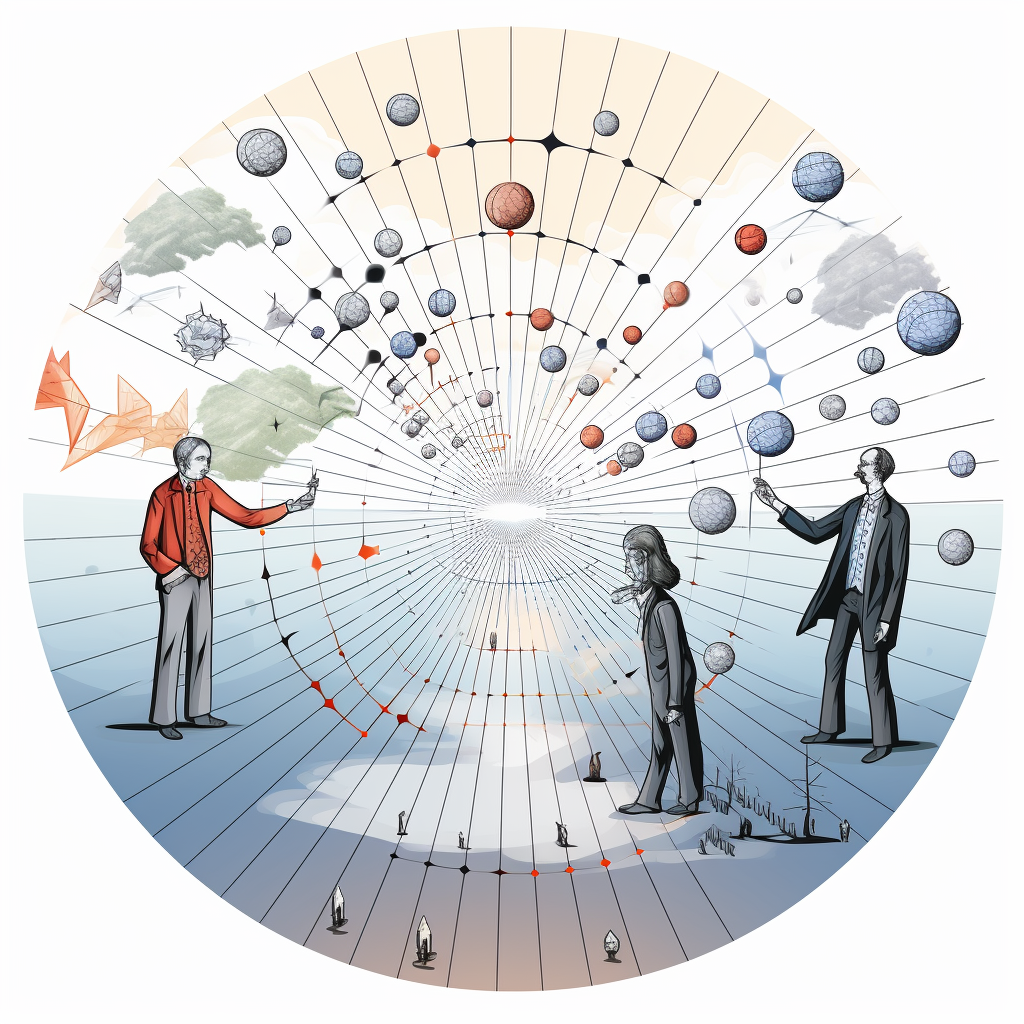
How Metaphysics relates to Epistemology
Epistemology derives facts for metaphysics, and in turn, metaphysics derives facts about epistemology. From whichever side you’re approaching, the correct application of one discipline presupposes the other, but it presupposes it in an unequal way, where one guides the other, and the other follows the one. Just like in the relationship between a man and a woman, they are equally necessary, but not necessarily equal in their roles in the relationship to each other. They are both necessary to make up the relationship, but their roles are not identical.
Metaphysics guides epistemology, ontology guides facts, and epistemology supports ontology, supplementing it with proof. Modern scientists do not want to admit that a closer look at their ontology may reveal an “evil” intent, so they hide behind impartial facts, behind neutral facts about nature, to work behind the scenes and implement their vision of nature, which is all too strongly motivated by the ontology they assume is not present.
Any real divide does not originate from one system being antithetical to the other, but rather, if there is going to be any divide, it will indicate what each discipline is concerned with. The distinction between metaphysics and epistemology is that they inquire into different elements of the same truth. The former is the inquiry into the nature of things that makes them the kind of things they are, without needing to fixate on any specific thing. Whereas the inquiry of the latter deals with specific things as they each are distinct from each other, without needing to know the nature of what they share in common.
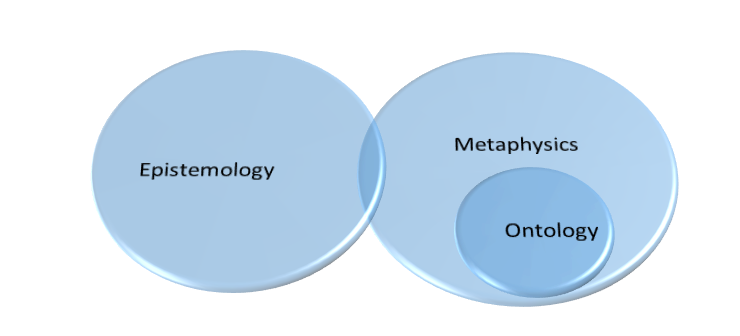
Universal Cause
Metaphysics deals with Universal nature, which means you can talk about the “cause” essential to many different “effects” without talking about any one of those “effects” in particular. Whether you reference a chair, a dog, or a man, sometimes in metaphysics, the point is to discuss something beyond the particular point of reference. For example, you use the particular as a gateway to talk about something beyond it.
Whereas in epistemology, you only talk about the particularity of the thing without discussing the essential cause beyond it. For example, you can look at a chair and say it is brown, hard, has four legs, made out of wood, etc., without talking about its function, i.e., made to be sat on, which is the reason why it was made. However, applying both of these disciplines in a partial way, where one is independent of the other, opens the door for dogmatism in either field. We see this today when you are in a class about epistemology; the point is to be as least metaphysical as possible, which is ironic because epistemology presupposes metaphysics as a prerequisite.
Epistemology is argued to be separate from metaphysics insofar as the result it achieves—facts about the world—is argued to be entirely done by the observation of the phenomenon, and no further thinking is required about the phenomenon beyond its appearance. This is true to the degree that it is practical to derive the initial facts about the phenomenon by way of appearance, but this is also the limit for further knowledge. When it comes to the totality of the phenomenon, the observational facts about its initial nature are assumed to characterize its entire nature. This is where metaphysics becomes a necessity for epistemology.
Metaphysics seeks “beyond” the physical by ascertaining the rational (abstract) element in the phenomenon.

Concrete vs Abstract
Epistemological philosophy aims to conceive the different form Reason takes in the world. Let us begin with what will be determined as epistemological knowledge. Epistemology separates and distinguishes between facts in order to analyze each one independently from the other. This is even done within the same phenomenon itself. The phenomenon is divided into, first, 1) the “concrete,” which is separated from, second, 2) its “abstract” notion. The concrete is ordinarily considered to be the physical aspects of the phenomenon that can be observed through sense perception. The tangible is conflated with the “concrete.” However, the notion is much deeper than that, because the concrete presupposes the actual and real nature of the phenomenon, even if that reality is intangible. This is its total nature, and its mere tangible aspects are not necessarily the total nature of the phenomenon.
The abstract is distinguished from the concrete on the grounds that it lacks reality; it is only the theoretical side of the phenomenon—i.e., theories and our ideas about it. However, in the notion of the abstract, there is an answer for how the concrete describes the total nature of the phenomenon. Since the abstract is not tangible in the sense-perceptual way that the concrete is, it still exhibits a real element in the phenomenon. Its tangibility lies in the fact that it is the purely rational aspect of the phenomenon. What does this mean exactly? The purely actual nature of the phenomenon—i.e., its abstract side—refers to the actual movements and motions that generate its concrete side into observable being. The abstract is the determination, the instances of becoming into, and out of, being, from the mind external to the concrete.

Contradiction of Irreversibility
Aristotle’s “law of non-contradiction” and the “excluded middle” dissect the notion of Being into abstractions—moments that can be independently identified while still part of the same unperceived whole. The abstraction of Being is contested against its opposite moment, the abstraction of non-being. The “law of non-contradiction,” which serves as a “solution” to any contradiction, posits that no two opposing determinations can be true at the same time; for instance, being or non-being, but not both. For example, from a spatial perspective, two objects can occupy the same area of space, but they can never occupy the exact same point in space. If they did, they would be the same object. An event, moreover, is subject to a similar law of non-contradiction: in the space-time domain, an event can never repeat exactly as it previously occurred. Events must always be “novel” (new) in order to possess efficacy in the world.
This relates to the “law of irreversibility,” which defines the modern-day concept of “time.” Irreversibility in the context of time states that once an event occurs, it can never repeat in exactly the same way. An event can never be replayed backwards in the same manner it happened before. In other words, it is impossible to go backwards in time or to “rewind the clock”. A similar event can occur, but it can never repeat exactly the same way. This physical phenomenon is best understood in the context of mental substance. Once something is known, it can never be unknown. The property of consciousness is that once it perceives something, it now knows it. For instance, once you play piano music well, it becomes much harder to play it poorly. This concept explains the law of irreversibility: because physical nature itself is rational, just like the mind within it, they both operate under similar laws of Reason. Once an event occurs, it can never repeat exactly in the same way, because it now bears a record in the history of the world.
Nature is not a random system where things happen and then cease to be forever. Although from a physical standpoint, it might seem that something either exists or, once it degenerates, no longer exists, from this observational standpoint, things appear to come and go without leaving a trace. However, at a more subatomic and fundamental level of reality, matter itself possesses memory. For example, DNA is a perfect representation of the memory of biological organisms. Evolution itself is based on this principle.
Irreversibility is a property of time because, once an event occurs, it occupies a unique position in the fabric of spacetime. The moments that unfold in this way can only change into something else. Thus, even if you wanted to recall or recreate the same moment, it would itself be a new action of time within space. The law of non-contradiction simply states that no two or more principles can occupy the same time and space while still being different from each other. Either they become the same, meaning there is no contradiction, or if they are different, they are not the same as such, and therefore occupy different moments and position within spacetime.
Aristotle is keen to propose that principles be integrated into a concrete whole. In other words, the negation of a proposition is true if the proposition is not true. If the proposition is “not true,” then it is “true” in being “not true.” The “concrete” is “whole” when the opposite of the tangible truth is encompassed as part of the truth claim. When the “law of non-contradiction” states that the substrate undergoing the process of being or non-being is something that already possesses both concepts as a unity of different moments, it means that any proposition determined as ‘either/or’ is already a complete synthesis between being and non-being. Every other form of dualism exists implicitly in anything that is complete.
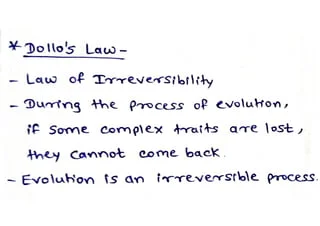
Law of Moderation
Aristotle proposed the law of “non-contradiction” and the law of the “excluded middle” to elaborate on their inverse notion: the principle of moderation. Aristotle’s principle of moderation, though not explicitly stated as a single theory in his works, can be understood through his discussions on balance and the “Golden Mean,” which is closely related to the idea of moderation. In this principle, moderation refers to the idea that virtue lies between extremes, and that the best way of being or acting is to find a “middle ground” (better stated as a resolution) between excess and deficiency. The principle of moderation is the synthesis of the two, the resolution of being and non-being. Any concrete, i.e., full object, is a moderation between extremes because it encompasses them. In other words, any object or “pick-out” conception represents the middle point, disclosing two opposite conceptions.
For Aristotle, moderation is most often discussed in the context of ethics, However its application can also extend into the laws of physical nature. Aristotle suggests that a virtuous life is one in which individuals avoid extremes of behaviour, emotions, or actions. This idea is encapsulated in his concept of the Golden Mean, where each virtue is the balanced state between two vices: one of excess and one of deficiency. For example, courage is the mean between the extremes of recklessness (excess) and cowardice (deficiency). Similarly, generosity is the mean between prodigality (excessive generosity) and stinginess (deficient generosity).
Moderation is also seen as a characteristic of the natural world. Aristotle believed that in nature, balance between opposing forces is essential for the existence of objects, processes, and living beings. For example, physical objects, ecosystems, and living organisms maintain their stability through a kind of moderation — a dynamic balance of forces and changes. Therefore, the principle of moderation, in both ethics and nature, involves finding the right balance between extremes, the so called “balance” is the solutions to the problems brought about by excess.
Moderation means “equal” symmetry NOT in the sense of a “middle” point, like a portion between two far out points, but rather it is the unity of extremes that produce the kind of resolution to imbalanced naturally inquired by nature. The notions of being and non-being, life and death, are unified in any material object. Each material object goes through a process of “degeneration and generation,” such that the kind of organization that maintains its qualities is always in a fluctuation between “no longer true” or “longer true.” In the visible universe, moderation is the essential principle of any object. However, the concept of moderation itself presupposes an imbalance between things in their external relations. How things interact is never equal. Once an object possesses the kind of moderation that allows it to be the kind of object it is, it contradicts other objects, which have achieved their own kind of moderation but act as extremes to other objects.
What is moderate for one object is extreme for another. But it is precisely this imbalance that creates the kind of order in the universe that is naturally observed by the senses. The imbalances in moderation are not disorder; rather, moderation is the balance of extremes. The asymmetry between objects—how they are NOT each other—assumes an element of disorder in our understanding. How can an object of a certain moderation maintain its unity when it is infringed upon by another object, which serves as an extreme to it? Why does the gravity of the Sun NOT collapse all of its surrounding planets? The answer is captured by the idea of synchronicity.
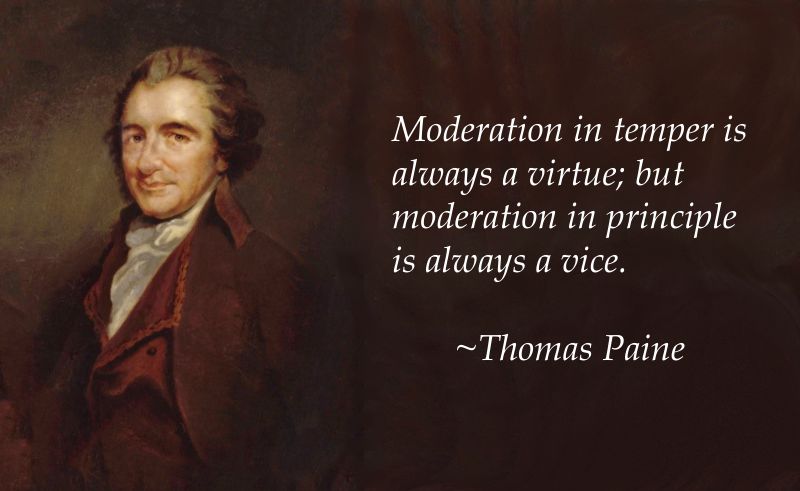
Problem with Specialization
In the postmodern academic setting, philosophy is often detached from the sciences. Modern physicists are seen as “instruments” for applying concepts without questioning their ontological nature. How a particular concept is related to the nature of the whole is seen as beyond the scope of their field. The problem with these specializations is that anything beyond the narrow focus of a topic—even if it could supplement the topic itself—is viewed as veering into a different field, which is not supposed to be accessed by anyone who is not an “expert” in that field.
Physicists simply do not possess an ontological understanding of the concepts they apply, because that is seen as not their “specialization”—i.e., the specific field they are meant to focus on. They are not meant to doubt the already formalized system of science, but are concerned with exercising it. Yet, at the same time, they are encouraged to expand the field, within the field, without ever veering into philosophy.
It is similarly ill-advised for philosophers to adopt the concepts of the physical sciences and understand their essential nature. Of course, the reality is that philosophers must use the concepts of science, and in turn, science must adapt a philosophical system; but we are taught that they do not! Philosophy is often smeared with a mocking tone. Scientists are praised as successful if they exclude philosophy as much as possible, rather than include it as the foundation for thought. A science that is least philosophical, as possible, is supposedly asserted as the most successful one.

Free-Thinking
Philosophy is synonymous with “free thinking” because the systems of operation themselves are often incorrect, while the system being operated on is always correct. Free thinking is NOT, as the liberal doctrine suggests, the ability to think whatever and however you want. This application of thinking is undisciplined. Thinking without reason, however, is reckless and often leads to degeneracy, which, as the word suggests, has twofold meaning: first, degeneration refers to the decay and destruction of matter over a long period of time; second, “degenerates” refers to people in society who are considered to be lower class. The degeneration of society is for instance observed in the lower class of society. However it is only obvious there, in other areas of society, it is ambiguous. Free thinking is, instead, thinking that accords with rational and universal principles.
The conservative view of free thinking is also flawed, as it reduces universal principles of Reason to what is commonly shared among a group of related individuals. The conservative approach is wrong because what is “commonly shared” by a group of people may, in fact, be inherently divergent from true, universally rational principles. In this case, the individuals with the highest capacity for reason must intervene and challenge the generally accepted views shared by the group. The categorization of thinking and its relation to freedom into the two notions of “liberal” and “conservative” actually describes two inherently erroneous ways of thinking, rather than simply two attitudes of thought. Both are false because they are extremes of each other. The truth of each lies in the fact that there is a group, and individuals within that group. The ethos of the group is conservative because of the bare necessity for survival and the species’ continuation, while the soul of the individual is primarily liberal, seeking freedom and individuality.
Freedom in the intellectual realm also raises the question: what is the difference between the application of a concept and the concept itself, independently of its application? For example, mathematical equations in general cannot be wrong, but their application is often incorrect or incomplete, and the scope of their full apprehension may be limited. This challenges the very function of physicists, who depend entirely on mathematical models to understand the world. The universe is as free as the thinking that apprehends it. We only try to divide reality into nature, which is straightforward, and the mind, which is unpredictable.

Aspects of Wrong Thinking
There is a contradiction in the aim of philosophical inquiry because part of thinking is reflective, which involves the elucidation, in the form of being conscious, of the ideas that naturally arise in the mind. What Hegel calls “reflective” thinking is logical because it outlines every possibility of thought. However, all possibilities of thought must include the aspect of thinking that is “wrong.” Negative thinking, or thinking in the negative, is a positive determination in thought because even “false truth” is true in the sense that it must be pointed out.
A complete logic must include, as part of thinking, erroneous ways of thought, because this is an aspect of comprehending thought comprehensively. This is not to be confused with sophism, which involves arguing for false knowledge as if it were true.
Ad Hominem Fallacy
The ad hominem fallacy concerns argumentative strategies in which the topic at hand is avoided by attacking the character, motives, or other attributes of the person making the argument. The function of this fallacy is to distract the thinker away from the substance of the argument by focusing on the person making the argument.
The source of the argument, however, is an aspect involved in its validity. In other words, the person making the argument is a fact about the argument; without the person, the argument on its own has no intent. In fact, the technical purpose of the “ad hominem” fallacy, and the reason for its usage, is not only to divert attention away from the argument by focusing on the intent of the person behind it, but also to address the person directly making the argument—i.e., to ask what his intentions are and how they influence the argument. Hence, its Latin translation—ad hominem—precisely means “to the man,” which implies addressing the man. It becomes a fallacy when we forgo the argument and focus solely on the person making it.

Erroneous Reasoning
There is an entire field of study in logic dedicated to the elucidation of erroneous reasoning, known as “logical fallacies,” which do not form a strict division from so-called “correct reasoning.” Errors are the side of logic that have become misuses or deviations from the “correct” way of thinking.
The term “correct” in logic is akin to what is known as “virtue” in ethics. Logical fallacies are intellectual “sins” if they are ascribed a moral significance. For example, the famous ad hominem fallacy does NOT mean to never consider the subject as contributing to the effect of the object, but rather that it is wrong to attack the subject when considering the object because that simply goes off-topic. Staying on topic is a virtue in thought.
There are two ways in which the same fallacy can be a virtue: First, the object and subject must be separated if they are to be differentiated from each other. One concept must not initially be conflated with the other. They must be properly laid out as different before they can be related to each other. If, for instance, a man makes a point about atomism and that point is dismissed because he is ugly, this simply diverts the discussion away from the matter at hand and into a different topic.
Second, it is equally important to reveal how the subject is part of the full explanation of the object. For instance, it is NOT at all irrelevant that the person making an argument for atomism has certain personality characteristics, such as being a positivist, empiricist, or an analytical thinker. All of these traits are generally associated with individuals who view the world as only material. It would be erroneous not to include these traits as part of a comprehensive analysis of the relationship between the subject and object. What traits are relevant or irrelevant is part of the question.
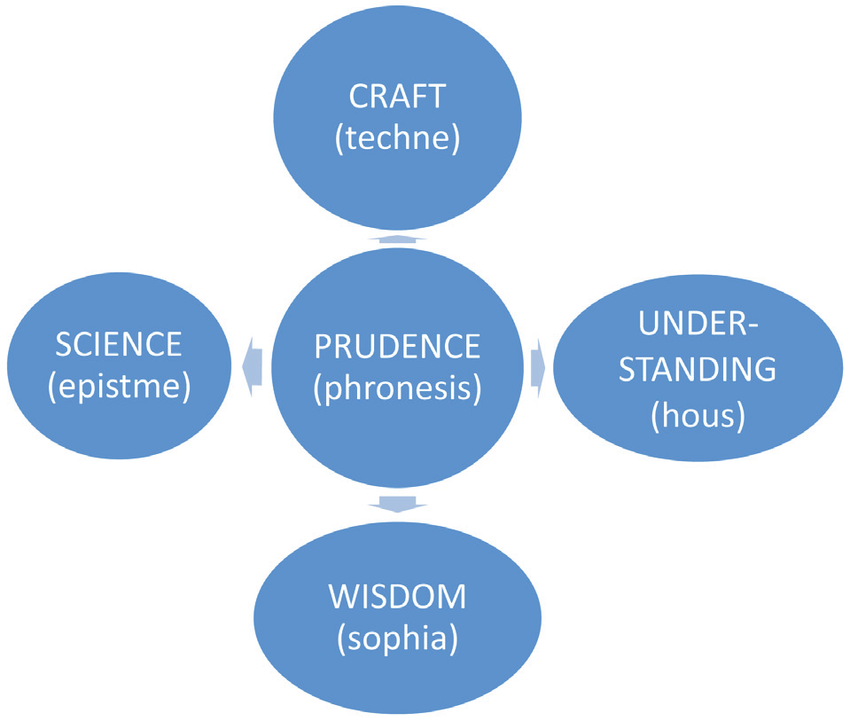
Post-Modern Fallacy
The postmodern tradition inherently involves an ad hominem fallacy in its way of thinking. They often utter the following fallacy:
“Who is to say that one view is ‘truer’ than another view?”
This assertion implies two things: 1) that individuals have no moral integrity to disregard any other person’s view, and 2) there is no agreement on truth; i.e., truth is merely relative to each individual. The first point is used as a way to disable anyone from criticizing others. It is impossible to have no criticism of someone else’s view, so they benefit by placing guilt on those who do make a criticism. Those who do not feel guilty use it as a way to silence others from critiquing them, while they criticize others.
The postmodern way of thinking is designed to allow false or erroneous thoughts to be spewed without being criticized. What is the problem with falsities disguised as truths? They confuse and manipulate the population into believing an untrue worldview about reality. They literally change the view of reality into something obscured! If the person making the argument is the only matter to the argument, meaning the person is considered irrespective of their argument, the argument loses its soul, its place, and becomes divided from the person. The person without the argument is vulnerable, predictable, and manipulable. The idea, initially separated from the person, is used to control them from the outside by being divisible from them.
They place the “blame” automatically on the subject, analogously to the way Christians blamed man at birth for being an “original sinner.” The postmodernist reduces all arguments to the characteristics of the person making the argument. For example, in countering “racism”—which is an ideology created as if it is real, and therefore might as well be “real” whether it is or not—they make race an indivisible part of any argument. In other words, the same argument is taken differently when made by a black woman versus when made by a white male. They could be saying the exact same thing, but their arguments will be treated differently because of their race. The “who” in the statement will determine the response to the argument. This is a way of getting around truths that cannot be otherwise denied. Focus on the individual, evade the idea, I.e., in other words, separate the thought from the mind.
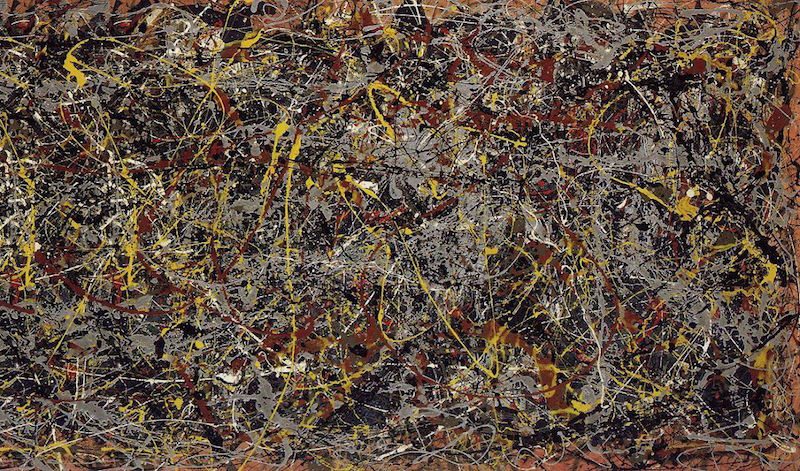
—
The “Truer” Forms
In the science of logic, the word “truth” refers to an activity of formulating valid structures, but structures are valid insofar as they exhibit real existence.
The logical, and even the mathematical, Plato’s Forms are more true than the objects that take them on because the Forms are not identifiable as a certain “thing” but rather as a certain structure or relation of an action or activity. The Form of a table in a mathematical sense is not the same as the table being directly perceived as an object because the form of a table is simply four long square prisms parallel to each other, attached perpendicularly to the four edges of a rectangular prism adjacent to one top of each pillar.
A table characterizes this form, but other objects can exhibit the same form as well. Thus, that geometric relation is more fundamental than the objects that exhibit its nature. For Plato, being more fundamental means nothing if it does not exist more fundamentally as well. In other words, the geometric shapes we take to be purely abstract ultimately have a more concrete existence than the objects we claim to be the most real, perceived by our senses.

Descartes vs. Kant on Reason
Kant goes further than Descartes because, instead of questioning the existence of his own reasoning, he took it as something self-evident. He then used this self-evidence of doubt to question the thought doing the doubting, using the same substance (reason) to question the nature of itself. Kant therefore necessarily presupposed that the ‘bare’ activity of reasoning itself is self-evidently true, and then he turned it against itself, making it question every move it makes, assuming that each move is self-evidently true.
Kant made Reason into a ‘monitoring system’ over every move it makes. This phase in Modern thought is a very interesting development in the phenomenon of self-consciousness. What Descartes, Kant, and finally Hegel found is that the very capacity for reasoning involves the ingredients for the objects it takes to question. Kant turned his reason against itself and proposed his work as a “Critique of Pure Reason” — not a critique of someone else’s reasoning, but of reasoning itself, which he took to be an objective and universal phenomenon happening in him, though not completely identifiable with who he considers himself to be. In other words, reason is divided in these different aspects of himself, and not himself.
The word “critique” is NOT a dismissal of “Reason”, but an assimilation of the natural operations of Reason happening in the mind, treating them as objects that are objective for study, much like we treat physical laws as objects of study in the motion of the world. Hegel took the method of “pure” reason forward by properly placing the objects of reason in their fundamental mechanics in nature, like placing the idea in the object, as if the concept is the “mind” of the object, describing its behaviours and intentions. The “idea” of the object, its rational form, is like the “mind” of it, guiding it not only in terms of locomotion, as we describe the rational physical laws, but the “mind” of the object also guides it by forming it into the kind of ethical value it presents itself to the observer.
Flat or Sphere Earth
The objects of reason are “concepts” in science that we deem “abstract,” but they have a fundamental role in nature, much like space and time in the universe. The concept is the “design” of the object, and that is its fundamental role. The objects of “Reason,” which are concepts, can be dissected similarly to how their physical counterparts are broken down and investigated. However, just as a physical object requires another physical object to break it down, Reason likewise requires itself, its own kind of substance, to differentiate it. The substance of Reason is “mind,” and Reason is the substance of mind.
The mind, or Reason, is the common denominator in explaining all physical phenomenon happing externally for the mind as the objects of conception. For example, to demonstrate the above deduction, consider the shape of the Earth, either flat or spherical. Both of these opposite sides of the same coin coincide into a contradiction and dismissal of each other. If it’s spherical, it cannot be flat, and if it’s flat, it cannot be spherical. However, both of these dimensions are simultaneously coexisting as different conceptions of the same infinite phenomenon.
When the Earth is seen from a finite position within its portion, it appears flat. However, when the Earth is viewed as a whole from outside of it in space, it appears to be a spinning sphere. Can it be that the sphere is spinning from the outside, but on the inside it is a static flat slab of nature? What if I am on a flat slab, intersected by a moving sphere around me? This ever-moving sphere around the flat dimension disclosed within it, is constantly changing, and so this rapid change appears as a spinning counterclockwise motion with a definite direction from the outside. From the outside, it is a morphing perfect ideal shape, like the circle, which is the first shape, but we assume it is a sphere because it is in motion, moving counter close wise. However, when you examine the content of this movement, you notice that it is static on the inside. If you zoom in anywhere on an area of its surface, you notice a definite series of actions concurring at a rapidly coexisting changes of events morphing into the same set of differently shaped substance continuously on a static spatial field. The landscape is morphed into different variations of itself. The mind actually determines the conception of the earth, and the conception actually discloses the physical laws of the phenomenon observed by the mind. The same object is not exactly the same thing for the same observer from a different point of view.
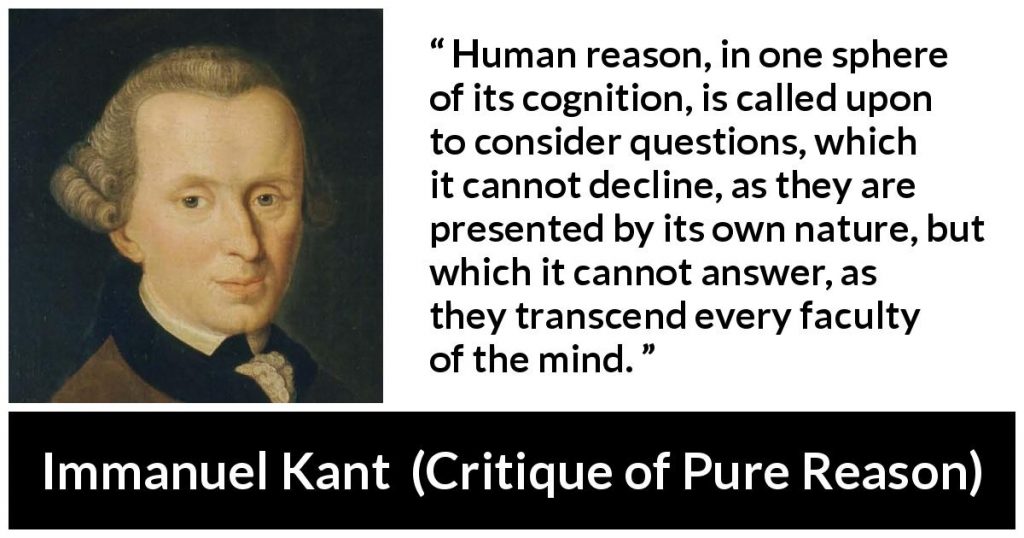
Contemporary Sophism
There is a difference in the intellectual attitudes between the process of actually pointing out true thinking, as opposed to the sophism of pretending to know the “truth” by impressing the opponent. In the latter case, the thinker pretends to never make mistakes in the exposition of an idea. In sophism, mistakes in thinking are seen as a weakness in the truth of the argument. However, truth is never the ultimate goal in sophism anyway. The goal of sophism is to “defeat” the intellectual aptitude of the opponent. Sophists often argue endlessly until they tire out the opposition, and the last person standing is considered the supposed winner.
The sophist tries to exhibit mental fitness by memorizing an idea and regurgitating it in a perfect manner as stated by someone else. They frame this skill as “avoiding misrepresenting” the idea. Modern academia consists largely of this intellectual showboating and virtue-signaling, where individuals repeat each other’s opinions to have their own seen as equal, regardless of how wrong it may be. Intellectual exertion is part of the virtue of understanding; however, it is only (1) one among many virtues and, by itself, aimless.
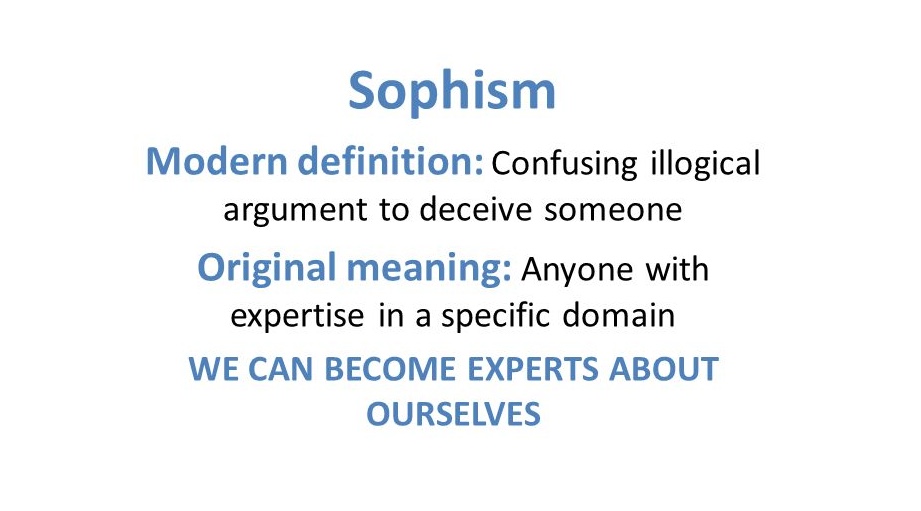
Honesty
The intellectual virtue of “honesty” is underrated, but it is important in the field of psychoanalysis, in the sense that a patient and doctor must be “honest” with each other. The latter is almost impossible because you are always constructing an image for someone else to depict an idea that one can only experience themselves. It is similarly important in ontology for the philosopher to be honest with themselves about what they observe in thinking. What stops most people from doing well in Metaphysics is simply a lack of courage to face the thoughts occurring in their own mind.
Honesty, however, is NOT easy because you cannot always “be” it. Even if you want to be honest, you do not always know what to be honest about. You are left with the assumption of telling the “truth” without knowing what the Truth is. Honesty is equated with “true awareness” and stems from a place of knowing something. In order to truly be honest, you have to first take the step of knowing.
People take their own thoughts as something personal, and they assume they cannot make what is personal an object of study. For example, the empirical materialist distracts themselves with the complexities of nature to avoid facing the true substance of the world, which is internal — they fear their own mind. Every person intuitively knows that their abstract self-reasoning is the constructive element of reality, the place where nature is determined into being. This is why, in psychoanalysis, the “mind,” and all the processes we take to be personal, are treated as objects of study.
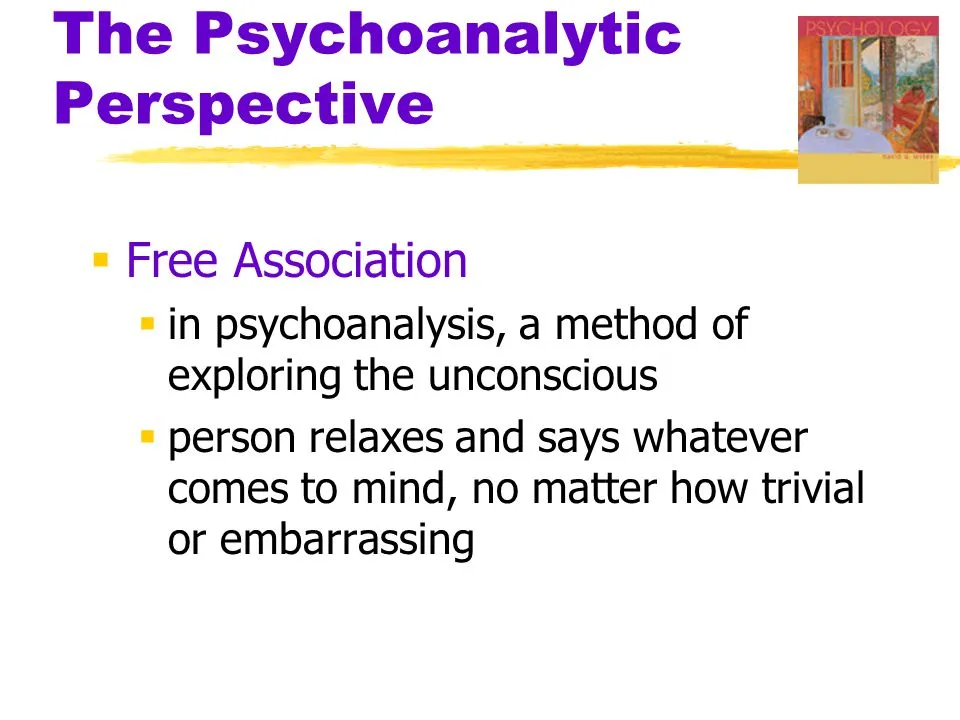
“It’s All Random” Entropy
Most people would rather leave what happens to them up to “fate,” or, as the vulgar materialists say, “it is all random,” to avoid responsibility for what’s to come. They claim “everything is random,” but this assertion fundamentally contradicts itself because any “system” (1) first originates from a non-random source, and (2) second it is a definite claim about the certainty of the world. That is, the claim that “the world is uncertain” itself provides a fact about certainty. Whether we say there is no certainty or that the world is uncertain, it still brings about a certain claim about the world. These claims do NOT properly place uncertainty in relation to certainty.
Nature is beautiful and sophisticated, but without an understanding of its internal side—namely, the observer—it is merely an aggregation of random events. The same applies to the history of thought, or rather, history as a rational process. As Hegel says:
“The history of philosophy, on the surface, appears to portray a set of ideas that seem to follow each other by accident, and from this follows the need for a philosopher to bring these ideas together. But it is not so, for during these thousands of years, the same architect dictated the work. This architect is one living mind whose purpose is to think” (Encyclopedia 13).
When we talk about the “same architect” of history, or, as Jung calls it, the “collective unconscious” of the species, how does that mind work, and how are individuals variable parts within it? Where is this kind of history going, and what is its process? According to the exposition above, history is always falling into error (chaos), and it is always correcting itself, moving towards absolute order.
In entropy theory, the 2nd law of thermodynamics states that for a “spontaneous” system, i.e., a process that arises without an explained cause, the entropy, over a stretch period of time, increases. In other words, the process increasingly becomes more and more chaotic as time passes. However, the 2nd law, on its own, is an abstraction and therefore incomplete. The second law of thermodynamics is inductively true in the sense that from what we “observe,” as time goes by, physical objects decay, and eventually, the observer will die, ceasing to be themselves. Every object has the feature of decaying over enough.
Decay is an inherent feature of many systems over long periods of time. The principle of entropy is closely tied to this idea: it suggests that systems naturally evolve toward a state of higher disorder or randomness over time, unless energy is put into maintaining or organizing them. Entropy, as stated in the 2nd law of thermodynamics, is the measure of disorder within a system. In any isolated system, entropy tends to increase, meaning that over time, the system becomes more disordered and less structured. This is often understood as a tendency for things to “decay” or move towards chaos. The principle of entropy predicts that things will eventually break down or become chaotic unless energy is applied to keep them in an ordered state. This is a natural, inevitable process unless influenced by an external force. The latter conclusion is the premise for the 3rd law elaborated below.
Conversely, the 3rd law of thermodynamics states that, “A perfect crystal at zero Kelvin has zero entropy.” This means that an orderly system, or a predictable one, becomes more and more orderly over time, or at least maintains an inertia of order. Inertia is maintained either by having no energy at all or energy at a contest rate such that it exhibits no change in energy. An ordered system, such as a “crystal” at a certain temperature, has “zero (0)” entropy and, therefore, remains itself for an indefinite period.
2nd vs 3rd law of Entropy
The 3rd law contradicts the 2nd because while the 2nd law states that decay (disorder) is an inherent part of any system, it also conditions that some objects, with only their own internal energy and uninfluenced by an external source of energy, can maintain order for an indefinite period of time. Therefore, the factor determining the decay or the inertia of energy is the external relationship between systems, each having its own internal source of energy. It is the external influence of one system on another that causes this generalized objective state of decay known as entropy. There is a bit of tension between the 2nd and 3rd laws of thermodynamics, especially when viewed through the lens of energy flow and entropy.
To clarify:
- The 2nd Law of Thermodynamics states that in an isolated system, entropy (or disorder) will increase over time. This means that, left to themselves, systems will naturally tend towards a state of greater randomness or decay. It’s essentially a description of how things “fall apart” over time if no energy is added.
- The 3rd Law of Thermodynamics states that at absolute zero (0 Kelvin), the entropy of a perfect crystal is exactly zero, meaning the system is in a state of perfect order. In other words, as temperature approaches absolute zero, the system’s entropy approaches zero, and thus, it maintains an ordered state indefinitely.
Now, here’s the potential contradiction pointed out:
- The 2nd law describes a tendency towards disorder unless energy is applied to maintain order, essentially saying that disorder is the natural state.
- The 3rd law suggests that there is a possibility of maintaining perfect order (zero entropy) indefinitely under the right conditions, specifically at absolute zero where there’s no external energy (or heat) influencing the system.
This can seem contradictory at first, because the 2nd law implies that all systems naturally decay (i.e., entropy increases), but the 3rd law implies that perfect order can be maintained under certain conditions, even in the absence of external energy input.
The way to reconcile this apparent contradiction:
- The 2nd law applies to systems in motion, where energy is being exchanged, and where the natural state is a drift towards disorder as energy disperses.
- The 3rd law is a special case, applied to perfectly ordered systems at absolute zero, where motion ceases and there’s no external energy influencing the system. Here, entropy doesn’t increase because the system is at its lowest energy state, and no further decay or disorder can occur.
In this sense, the two laws don’t contradict each other—they operate in different conditions. The 2nd law applies to real-world, active systems, where energy exchanges lead to decay over time, while the 3rd law describes a theoretical, static condition where energy exchanges have stopped, and thus, entropy reaches a minimum (zero).
The key factor in determining whether entropy increases or decreases is the external relations between systems. In a system that’s not isolated (like the Earth), external energy inputs can delay or counteract the effects of entropy. For example, living organisms take in energy from their environment to maintain order and organization within themselves, despite the entropy increase in their surroundings.
So, the external interactions and energy flows play a crucial role in determining whether a system decays or maintains order. The 2nd law governs the natural tendency towards disorder, but it’s the balance of external forces that can either accelerate or mitigate this tendency.

Peirce – “Reason tends to correct itself”
The following conclusions can be logically drawn from the previous observation: What initially appears to be a chaotic process, over a long stretch period of time, develops into pattern and absolute order. Reason is the substance at perfect order in its composition as an abstract matter. The American pragmatist Charles S. Peirce explains that thought possesses the quality of becoming more and more orderly as time passes by. He says:
“This calls to mind one of the most wonderful features of reasoning and one of the most important philosophemes in the doctrine of science, of which, however, you will search in vain for any mention in any book I can think of; namely, that reasoning tends to correct itself, and the more so, the more wisely its plan is laid. Nay, it not only corrects its conclusions, it even corrects its premises.” (Peirce, Collected Papers 5.575)
The natural inertia of knowledge is that it corrects itself. For example, Moore’s Law demonstrates the same idea in the technological realm: it states that “the number of transistors on a microchip doubles every two years, though the cost of computers is halved.” In other words, the speed and capability of computers increase every couple of years, while their cost decreases and their availability increases.
Development is a natural process of time, which is what we mean by “evolution.” If any primal element in time is left alone to its own accord, it naturally develops into more complicated versions of itself. These versions are characteristic of a reasoning process that portrays all sides (possibilities) of any given random single phenomenon. Also, if we reverse the equation, any single phenomenon in time undergoes a duration in which all its possibilities are laid out. The outline of potential possibilities by the observer is the action of logic.
Knowledge does NOT belong to someone, but rather, someone belongs to a “field” of knowledge. We teach Aristotle in Metaphysics, or, respectively, Newton in physics. The supposition is that the field of knowledge is more fundamental than the individual. However, individuals give form to these fields by producing theories of knowledge. Without them, these fields are merely potentials within science. As we also say, it is the Metaphysics of Aristotle or the Physics of Newton.

Failure of Talking – Issues with Communication
Direct communication between people face-to-face is often inefficient. During a conversation, each person must manage a simultaneity of the following conditions: 1) the relevancy of the words being spoken, 2) their reaction to the external experiences those words trigger in the mind, and 3) the need to mitigate your feelings while internally observing the meaning of it all.
A conversation is never merely with someone directly in front of you; it involves multi-faceted problems related to language and spacetime in general. First, there are personal biases, like ad hominem issues, where the physical appearance of someone might affect your opinion about them (e.g., “you just don’t like their face”). Second, there are natural impediments, such as the time it takes to process an idea, and the space between the persons, where events can happen that disrupt the flow of communication. Third, there is the reality that people are not at the same level of development, so each person must adjust and adapt to the other.
There is also the most important problem of talking: how do you know that you are actually saying anything of substance? Talking is meant to point out meaning about the naturally observed world. There is truth that language is trying to transfer between different individuals, but how does the individual know they are not speaking nonsense? You might be saying nothing and everything simultaneously while talking. These are problems in every form of telecommunications, even communication over the internet.
The internet as a social platform encapsulates the communication problems outlined above. It often appears to be a stream of endless ideas clashing with each other without an apparent purpose. However, purpose can be found by the simple capacity of the “search” button.
When you search for a specific truth and find a definitive, incisive piece of knowledge about a specific phenomenon in the world, that is where truth may potentially be found. The reason it may “potentially” be found is because it exists in the specific form of knowledge, where all the biases of knowledge also reside. Even the most practical of knowledge may be a defense mechanism of one ideology naturally springing up against another.
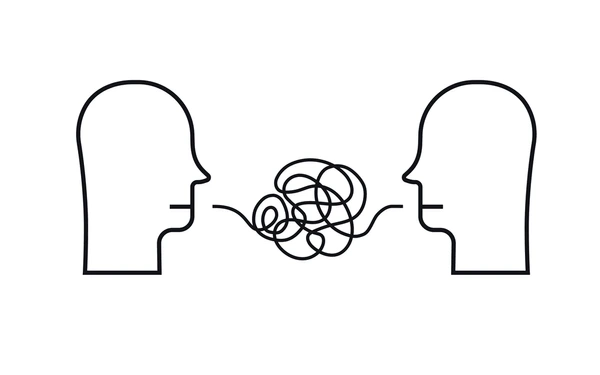
“Speaking [to] the Dead”
Ancient cultures recognized that there is something ultimate in the communication between the dead and the living, seeing it as the only true form of communication. Truth across epochs represents the only kind of communication that can truly escape individual biases. As a result, rituals of “speaking with the dead” appear across all cultures. The problem, however, is that the living and the dead are NOT in the same timeline. Superstition arises when cultures believe they can directly communicate with the dead as if they are present. The truer form of this communication lies in the greatest works and contributions from the dead to the living.
This form of dialogue is identical to the individual thinking for themselves. Ontology operates under the assumption that the individual does not merely get to know the truth, but has to do something with it—Truth and Being are indivisible. This is why in Ancient practices—whether religious or philosophical—insofar as they are worldviews about the ultimate nature of reality, they constitute a way of life, not just a belief system. We tend to assume that having an “opinion” or belief about the world makes us unique among animals. It is commonly held that humans are rational because they can “think” without necessarily translating that thought into action. However, what we assume is the feature that makes us advantageous in the animal kingdom (thinking irrespective of action) is, in fact, our deficiency when compared to ancient civilizations.
One reason for engaging in ontology is the aim to establish a universal dialogue between the dead and the living, in order to preserve the fundamentals of truth across ages. Communication between the dead and the living is unfiltered because it occurs at different points in time and fully expresses the specific time period of each constituent. The present age has its “turn” to make the argument, and future epochs will have their turn to listen, pay attention. Ontological truths prove themselves true and practical through the experiences of individuals. The reader makes the work their own and gives it a full chance to be understood. Even disagreement with it reflects self-internal conflicts about the nature of the worldview in general.

Developmental Trends
Another erroneous anthropological assumption is to presuppose that the older a civilization is, the more primitive it must be. However, archaeological discoveries prove an inverse trend: the older an artifact is discovered, the more advanced (or complicated) it appears to be. Artifacts discovered closer to our time tend to appear more archaic and primal. Our modern-day anthropology is still in its infancy because it has primarily focused on artifacts aged 6,000 years and younger. It is only recently, with the advent of advanced lidar technology, that we have begun uncovering vast city structures buried beneath the surface. These ancient places and technologies (such as the pyramids in Egypt and elsewhere) are older than previously assumed, likely dating back hundreds of thousands of years.
The conclusion we can draw from this hypothesis is that the more advanced something is, the longer it tends to withstand the test of time and, therefore, is older. In other words, evolution may be operating in a backward trend, or at least in a hyperbolic fashion, where “history” may have initially advanced to its highest states, only then to regress into a more primal state. History may have reached a peak and is now in a recent bounce back toward an upward trend of evolution.

The “fear of error is itself the initial error”
We can say that the way of ontology is simply to “tell the truth,” which means speaking as honestly as possible about what you know to be happening in your mind as it apprehends the world around it. Ontology is not merely the elucidation of what you have gathered, deduced, or understood; it is about your position as an observer within the spacetime continuum. The trick of ontology is how to communicate your worldview as accurately as possible, and who is willing to listen? The observer is the narrator of their own mind, expressing outward the ideas as they naturally appear inwardly. In the study of ontology, the observer must be impartial to their thoughts, just as an empirical scientist is impartial to the phenomena. Hegel asserts the following to describe the attitude necessary for metaphysics: Hegel writes:
“Meanwhile, if the fear of falling into error introduces an element of distrust into science, which without any scruples of that sort goes to work and actually does know, it is not easy to understand why, conversely, a distrust should not be placed in this very distrust, and why we should not take care lest the fear of error is not just the initial error. As a matter of fact, this fear presupposes something, indeed a great deal, as truth, and supports its scruples and consequences on what should itself be examined beforehand to see whether it is truth. It starts with ideas of knowledge as an instrument, and as a medium; and presupposes a distinction of ourselves from this knowledge. More especially, it takes for granted that the Absolute stands on one side, and that knowledge on the other side, by itself and cut off from the Absolute, is still something real; in other words, that knowledge, which, by being outside the Absolute, is certainly also outside truth, is nevertheless true — a position which, while calling itself fear of error, makes itself known rather as fear of the truth.” (74)
The attitude illustrated above is the necessary mental attitude required for venturing into the study of metaphysics. The above passage critiques Modern attitudes of “impartiality” in seeking certainty in truth. Most famously, Hegel critiques methodological skepticism on the grounds that it aims to achieve “truth” before the act of knowing. He likens this attitude to the example of trying to “learn to swim before jumping into the water.” The errors accumulated throughout thinking are part of the thinking process itself, and the attempt to avoid “error” in order to achieve truth is a misapprehension of the thought process. The “fear of error” is akin to the “fear of truth” because it aims to avoid or conceal aspects of truth that may naturally arise as erroneous. Truth, in its full essence, reveals all aspects of itself, and from this revelation, we can categorize right or wrong, true or untrue, etc. But if we suppress error for some unknown ideal of certainty, we are committing the first error in uncovering the truth, which is concealing aspects of it. (Phenomenology of Mind 28-9)
There is a confusion that assumes that because the facts we have at the present constitute truth, there is no error in scientific facts. The confused logic goes something like this: the present facts are all we have of truth, so that means science has no error in its facts. We now know that Newton’s law of universal gravitation is untrue because Einstein demonstrated that gravity is NOT the effect of two objects on each other, but rather the “warping” effect on something else, their unity, known as spacetime.

Illusion of Impartiality
Modern academics claim that they are after accuracy, when, in reality, this is a way to suppress thinking that ventures too far from the facts generally accepted as true. On some level, this serves to maintain the “truths” science has preserved against nonsensical thinking. Today, there is an extreme divide between academics who lack the courage to think beyond the crude facts of empiricism and those who claim that mathematics and universal knowledge are only products of some oppressive patriarchy. In both cases, the former group has a deep fear of making mistakes, so they avoid embarrassment in front of their peers, while the latter seeks to showboat in front of theirs peers irrespective of the mistakes they make.
It is a modern illusion that a scientist must always say something ‘accurate’ because how can you know you are being “right” without first understanding what constitutes error? This means you must actually make the error—it’s a “controlled demolition” in the realm of thinking. Many shy away from metaphysics because they do not want to commit a misunderstanding, as that is often considered the worst scenario for the scientific thinker. Everybody pretends to know what they are saying, and they are afraid of appearing wrong.
Specialized sciences avoid the necessity for a certain kind of ontology by arguing that there should be no ontological motivation behind the process of empirical analysis, in order to remain “impartial.” This is done to observe a phenomenon as it naturally operates, without imposing confirmation bias. Yet it is precisely this method of “impartiality” that becomes the ontological starting point for empirical science. Moreover, they still operate on certain ontologies over others without acknowledging it. For example, we will later see that Modern contemporary science operates on atomistic ontologies, rather than organicist ontologies.
Being impartial to the truth means having restraint or temperance in academic research. However, the drive to seek truth is initiated by a prejudice for it. Ontology is the foundation of the structure of the sciences. A proper education requires that ontology be the prerequisite field for any specialization. Unfortunately, being the “foundation” of science does not mean “basic” in the sense of being simple or easy, because the most basic principles of ontology are, in fact, the most complicated facts for the sciences.

Idiocy of Specialization
Modern times can be identified as the era of specialization. Everyone is encouraged to be a “specialist” in some specific field, and this is a pragmatic move to accomplish a part within the system that forms a whole. Everyone has an ontology in the sense that they possess a worldview, but only a few thinkers are ontological.
The idea of “specialization” limits knowledge to a specific part in order to gain greater efficiency. When it comes to the production of goods, for example, specialization is necessary because the division of labor is broken down into numerous separate tasks, with different workers performing each task independently. The combined efforts from each part produce a complete product, which itself performs a specific task (function). However, when it comes to the acquisition of knowledge, as in the case of science, and especially in philosophy, specialization hinders the truth because it creates dogma and bias toward the field the subject is focused on. If I become an advocate for a certain worldview or field of study, that makes me dogmatic toward all other contradictory fields by virtue of believing that my own is the true one—otherwise, why else would I argue for it?
I must maintain the limitations of my field in order to remain faithful to it. We see this phenomenon happening in Modern academia, where you are forced to have fidelity toward the ideas of others who claim to be specialists in their field. This is the opposite of ad hominem—i.e., the fallacy from authority—where the title of the subject speaking necessitates that what they are saying is true. Even though they may ontologically lack merit, and their facts lead to wrong conclusions about the nature of reality, they still must be accepted because the methodology is favored over the truth formulating it.
Ontology is defined by “deep” thinking, which, as suggested by the name, means how far someone is willing to go into the canals of thought. How deep are you willing to venture into your own mind? But more than that, how far do you come out of it to construct an accurate picture of reality, leading to the present moment of the observer? Everyone, to some extent, ponders the bigger questions of existence. However, this is not the same as engaging in the science of ontology because common folks immediately latch onto a ready-made belief—such as Christian or Muslim faiths—to quickly satisfy their need for knowledge.

Faithful
Faith is blindly accepted by the “faithful,” but in reality, they are the “hopeless.” The hopeless-minded are those who have forsaken their natural ability to think by blindly adopting a scientific or religious ideology, so they do not have to investigate new forms of thought that might shock their conception of reality. They seek comfort in ready-made ideas and beliefs about how the nature of reality is perceived. Truth is packaged into a conception of reality, a conception that may or may not necessarily be true. I may possess a conception about what reality is because I have been shown this conception repeatedly as the true conception of reality.
I might live my entire life and finally end in death, never knowing that the conception I experienced was not real—meaning that something more fundamental than it was determining it the whole time. Even if this is true, it would ultimately not matter because the life I have lived would be no fundamentally different, whether I knew the truth or not. It would be exactly the same because it is already predetermined from the outset by a more fundamental reality than itself. So why are some awake and some asleep? For those who sleep, it does not matter because they do not know, so it does not matter to them. For the awake, they know it is true, but they cannot do anything about it anyway. Therefore, it also does not matter.
Faith is an unfortunate attitude to have in life because, while we all must inherently be “faithful” in the world as an ultimate reality beyond us, we must also remain faithful to the degree necessary for survival. That is, one’s outlook must remain optimistic for tomorrow. Faith is oxymoronic because, while its fundamental purpose is to maintain survival into the future, it inherently blinds the subject from conceiving beyond the worldview that has been readymade for them.
The faithful do not have to “busy” themselves with thinking deeply about fundamental questions. Faith or science provides all the answers they need to remain mentally monotone. However, it is also true that these religions, and in the crude sciences as well, contain deeper philosophies. The true thinker has a duty to explore them more intimately than what is presented to them by the mediocrity of commonsensical teachings. It is your duty to know; ignorance is a choice. If chosen, this choice is a sin, and it misses the mark.

Agnostic
Others feel a little bit cooler by remaining “atheists” or agnostics, simply maintaining a skeptical view about everything. But in reality, they just believe in the crudest truths, immediately provided to them by their senses. By definition, they tread in the shallowest parts of thought, closest to the immediate instincts of animals. As the thinker moves further away from these equally shallow extremes, they begin to swim deeper into the depths of Truth, which, at the deepest level, enters the science of ontology.
Only when a thinker descends to this level can they properly bring innovation into their specialized field. Otherwise, their mere engagement in a specialized field is just a regurgitation of the same old established facts over and over again. Most people are capable of thinking, but not everyone is able to think “deeply,” just as most people can run a short distance, but not everyone can run a long distance—i.e., marathon.
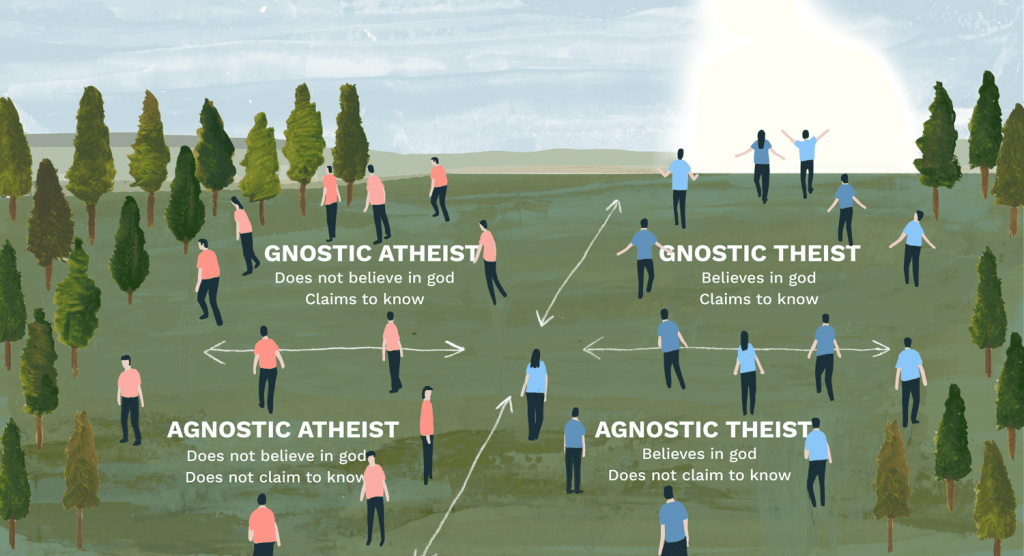
Infallibility
Hegel and Peirce both assert that science is an ethical process. The modern intellectual virtue adopted as a fundamental basis for truth—especially in epistemology—is the notion of infallibility. The concept of “infallibility” is embraced as a requirement for the intellectual virtue of “techne.” Like any virtue, it can be either abused or entirely neglected. When ignored, the thinker falls into error more often and becomes less precise in the application of methods.
When infallibility is overused, the thinker can become blind to their own arrogance. Arrogance in the intellectual domain occurs when someone states a fact as if it is true, without clearly explaining why it is true. We all do this to some extent when we want to win arguments. However, in this way, our thoughts become dogma. Modern academics today claim that infallibility is inherently “moderate” because it is considered liberal to be aware of one’s own fallibility—that is, the capacity to make mistakes. However, the very claim that infallibility cannot be abused is itself the first indication of its rash use. Awareness of fallibility is not enough to achieve truth.

Vulgar Skepticism
When fallibility becomes vulgar skepticism, the key is to apply it even to itself—doubt your very doubt. Skepticism is vulgar when it enjoys doubt for the sake of doubt; it is the sophist equivalent of skepticism. Do NOT doubt everything for the sake of doubting. Do NOT doubt something that is evidently true, as this will bring you back to where you started, having to prove its truth once again. The skeptic places the burden of proof on others and finds comfort in the uncertainty of the situation. The problem is that if this uncertainty has no proper resolution, it will lead to improper conclusions. The point the skeptic wants to avoid is the very point you want to reach, which is to prove something so that you may know it. Knowing is not a burden, but a privilege.
If a fact is questioned merely for the sake of questioning, then the infallible method should also question that very questioning: am I asking just for the sake of asking, or am I asking to derive some knowledge about the fact? This distinction is the difference between sophism and truth. How can one determine whether their fallibility is rash or moderate? It is difficult to practice fallibility in a moderate sense. The primary way to achieve fallibility in a moderate sense is to develop an understanding of the general principles underlying the particular science(s) at hand—whether it be the general rules of chemistry, biology, or the most general rules that constitute them all, such as the principles of logic, i.e., ultimately Metaphysics. The general rules of logic are the principles of metaphysics itself.
The fundamental question concerning the correct conduct of infallibility is to ask: Is my specialized science consistent with, and does it logically follow from, the general principles of metaphysics? If not, avoiding “falling into error” requires reassessing the specific truth to see if it aligns with universal principles. The next question you might ask is: Who gets to know universal principles? What constitutes “universal truth” is itself disputed. However, this dispute should not exclude any real knowledge achieved by metaphysics. Surely, from a standpoint of time, the “oldest science” did achieve truth passed down through generations. This is one instance of truth having the requisite of being universal, i.e., that it withstands time. The problem is, first, the person who produces truth may or may not see its application in the mind of humanity, and second, different people at different times will or will not recollect it in the proper or improper way. Perhaps the most fallible position of science is to claim that a field of knowledge carried out through time has achieved none of the truth, and somehow our most recent theories today have achieved all of it.

Metaphysics as a prerequisite
Contemporary education eliminates metaphysics as a prerequisite for the specialized sciences. In the past, a scientist first and foremost established a metaphysical framework, and specialized sciences followed as practical applications of the newfound worldview. Every genuine scientist must first possess a proper worldview in order to make sense of the specialized facts they derive about the world.
It is equally mistaken to say that metaphysical concepts should be abandoned in favor of the perceivable facts that we naturally derive. The abstract facts about the world are not merely given, but are accessed through primal sensations and later enriched by reflective thinking, which is an exercise of consciousness. The human mind instinctively confuses the purely sensual truths as “real” knowledge.
The metaphysical conception that materialist science today cannot accept is that the perception of the world primarily through the senses is illusory. In other words, sense perceptions provide a limited abstraction of the world, presenting it as if it were the complete version. The corrupt form of science confuses the natural logic of the observer, inverting it inside out with a formal logic reformulated for man by man. Today’s education makes it seem that you are thinking for yourself, but in reality, you are regurgitating someone else’s premeditated worldview—a version of reality that may be purposefully limited by the natural finitude of the senses.
A science becomes corrupt when it encourages the individual to focus precisely, and exactly, on what the sense perception is picking out directly in front of the observer at the present moment. The present moment is fundamentally illusory. Although it is all you have, the mind remains blind to the truth behind the senses. The infallible approach is to assume the application of fallibility.

Partiality
Modern science makes “impartiality” a duty against biases in hopes of achieving an accurate theory of the world that is objective. But when impartiality becomes a forced requirement and is adopted as a duty, one has to wonder if it is only a duty for those who naturally lack impartiality. Man is by nature partial, but this is a quality that presupposes impartiality; both must stand together, not eliminate each other.
Partiality is naturally a virtue when it is impartial. How can these two contradictory qualities presuppose each other? “Partial” has a twofold meaning: first, it means “partial” or incomplete, minimal; second, it means divided or selective, for example in knowledge, choosing to pay attention to certain things while ignoring others. The second meaning is consistent with impartiality as being unbiased towards knowledge. In order to select one fact over another, one must first be indifferent to both. However, there is a sense in which the facts also influence the thinker, guiding them to pick certain facts out. This is simply the conduct of curiosity.
In present scientific academia, impartiality is adopted as a duty to fulfill functions whose reasons are not entirely clear. In other words, scientists “ought” to be impartial towards the facts, but impartial from what? Scientists assert that the thinker should not involve their own personal biases when looking at objective facts, but the objective facts are derived from a personal attitude towards them. The scientist is meant to look at the objective facts without asking how they got there. The impartiality is only meant to separate the person from the fact, to remove the subject from the object.
Partiality is the virtue of temperance in the realm of science because it is the capability of deriving facts from nature, either through observation or experiment, while being aware of the thought process operating behind the scenes and listening to its contradictions. In other words, impartiality is the avoidance of dogma by not being overly consumed with confirmation bias so as to avoid overcompensating the activity of the thought process.
Thinking is a long-term activity, whereas ideology is the manner and mood of thinking. In psychoanalysis, an individual fixated on one kind of emotional mood is considered pathological. It is advisable that someone always angry seek psychological assessment. Likewise, should someone be too liberal or too fundamentalist, they may require intellectual assessment. It should be natural for someone who genuinely wants to learn and derive real knowledge to be naturally impartial. Although this is not an argument to suggest humans are infallible, this infallibility should not trigger such hesitancy that only after alleviating doubt should someone begin to think. Doubt is the fuel for thinking.

Dog-ma
Hegel utters a most fundamental value for metaphysics, one that is arguably inverse to the fallibilism of empiricism. Hegel says: “The fear of error is itself the initial error; why not place a distrust in that very distrust?” (Phenomenology of Spirit, p. 28). This is not to say that the scientist ought to welcome error with open arms, but rather that error, on its own, should not deter the scientist from embarking on the difficult questions of metaphysics. It may be no doubt that there are fallibilities associated with metaphysics, and one can even say that quantum theory has its fair share, but this is testimony to the complex nature that these sciences deal with as their subject matter.
Many individuals, especially those empirically inclined, disdain metaphysics because they do not want to commit a “misunderstanding,” as that is often considered the worst catastrophe for a scientist who prides themselves on accuracy. But their so-called “accuracy” in most cases ends up being dogmatism parading itself as impartiality.
Dogmatism is the clinging to some rigid method and finding comfort in the narrowness of their methodology so that they do not have to face the indeterminate nature of thought. They use the very indeterminate nature of thought as an excuse to cling to a rigid method of certainty, like the idea of “falsifiability” by Karl Popper. This is a sleazy way of acclaiming accuracy because it simply reconfirms what is already taken as true, without actually providing a basis for explaining how something comes to be truth.
The discovery of black swans disproves the notion that there are only white swans, but if we found purple swans, that would disprove the idea that there are only black and white swans. Falsifiability is only reactionary to what is discovered as true during a period, in conjunction with ignorance of a non-disproved fact. It bases any claim on the fact that whatever knowledge we have available at the moment constitutes what is true.
Modern science uses the slogan “consistency” as an indisputable principle to determine whether something is “true” or not. The “truth” is supposed to not “mislead” the objective observer. However, it ends up being the basis of misapprehension because it deviates from the question of how we know what we know. How did we come to know that there is a black swan in the first place? Did we stumble upon swans randomly? It is easy to say that not all swans are white after discovering there are black ones, but how did we come to know this fact? This is where the ontological attitude always creeps into the sciences, because science is always fundamentally ontological. The question is whether it is a good ontology or not.

Direction of Science
I hope to show that the principles of metaphysics supplement the science of quantum mechanics by providing it with the ontological basis requisite for its basic propositions. Figuring out an accurate ontology for the science of quantum mechanics is a task necessary for giving the science a sense of direction. Without it, the science will remain stuck in the dead-end of aimlessly deriving observations and making calculations. The so-called “material facts” about the universe are, moreover, designed to muddle the mind of the observer by diverting them from the true clarity they would otherwise achieve through their natural cognitive capacities—or, in some cases, through the use of psychedelics.
Induction and deduction, for example, are attitudes toward approaching thought. Induction, in the sense of “inducing” (like inducing vomiting), is the voluntary action of promoting circumstances to happen that would otherwise naturally occur. For example, it is akin to creating an environment for plants to grow. Deduction, on the other hand, actively negates all particular instances that naturally arise surrounding a phenomenon, thereby passively leading to the most generalized facts.

Inducing versus deducing (upwards vs downwards)
Definition of ‘Existence‘
The definition of science is identical to the definition of existence. Metaphysical science is distinguishable from all specialized sciences in the way that “existence” is defined. The definition of existence aligns with the definition of science: Hegel, in §1033, defines existence as:
“When all the conditions of a fact are present, it enters into existence. The fact is, before it exists; it is, in fact, as essence or as an unconditioned; secondly, it has determinate being or is determinate, and this in the twofold manner above considered: on the one hand, in its conditions, and on the other, in its ground. In the former, it has given itself the form of external groundless being because it is, as absolute reflection, negative self-relation, and it makes itself into its own presupposition.”
(The experience of itself; the end is found at the beginning.)
Wormholes are from higher dimensions (such as the 4th dimension), and therefore they do not make sense for our ordinary perception. In other words, we cannot physically perceive a wormhole properly because our minds cannot rationally process it. However, in terms of meaning, it is a very basic and simple phenomenon in space. Wormholes exemplify a fundamental aspect of our existence. The basic fact is that “wormholes” are simply portals. However, we cannot present this answer as a scientific explanation for wormholes because it is deemed pseudoscience, and for good reason: wormholes cannot be directly observed or properly explained. The concept of “portals” is a 3-dimensional perspective on wormholes. We do not perceive the extended space connecting two points into the same area but only see the intersection of the two points as a single hole in space, representing a parallel or alternative landscape of time.
“When all the facts are present, it enters into existence”; this means that reality only becomes present when its substance is connected. This can mean two pieces of spacetime coming into contact with one another, or metaphorically, minds sharing the same substance and being connected in that way. The idea is that substance must be connected with itself, either materially or logically, in order to be present. Existence is present for an observer when the event (phenomenon) is connected to the mind.
The specialized sciences begin with the assumption that all the conditions of the fact are already present, and the ‘business’ of knowledge is to confirm the fact by validating each condition. The problem is that each condition originates from some ground, which is not meant to be considered in the derivation of the fact. Materialist thinkers aim to explain things, but they argue that the origin of a physical fact is “beside” the facts derived from it, as if they are already present for consideration.
Philosophy has always been distinct from other sciences because it seeks to understand the “thing” in and of itself. What does it mean for a thing to be known as itself? The answer to this question can be explored by explaining how we consider a “thing” or a “single object” as an abstraction, part of a set of relations. The irony is that if you want to understand what a thing is in itself, you must explain how it is part of a set of relations. The origin of a thing lies within its relations.

Hypo-thesis
The hypothesis is a basis for reasoning without assuming the truth upon which it is based. I am going to assume that something is true before I know that it is true. The real question is: why would you assume something is true before you know it is? The classic materialistic response states that you first have to know—i.e., prove—something before you state that it is true. However, ordinary common experience tells us otherwise.
Every day, we live our lives knowing things to be true without ever needing to prove them. In fact, the proof often acts as an unnatural inclination toward knowing something. The thinker must first take the step of demonstrating something that they do not yet know. How can you do that? These are ontological problems. Ontology is fundamental for hypothesis because it provides the first presupposition that reasoning is based on belief. In order to begin reasoning, you must have a belief in truth. The hypothesis is a belief in truth.
‘Intent behind it’
The reason why the hypothesis is a logical initial step is because it reveals the intent behind the hypothesis. The first hypothetical question is as follows: why is the hypothesis purported? The specialized sciences operate on the belief that the hypothesis without an intent is the one that a scientist ‘ought’ to adapt.
A hypothesis made with an already presupposed disposition is labeled as a “bias”, which science is supposedly aiming to move away from. There is the good reasoning that a hypothesis is unbiased because the whole point of thought is to disapprove its hypothesis.
However, this cannot be fully true because it assumes that a hypothesis has no intent for the truth. The notion that a hypothesis is only present in order to be disapproved is the passive and reactive energy of scientific thought. Science in the reactive sense plays a passive roles and awaits for whatever exists before it is the source for truth. Like say how an object is received by sense percepts. The sense organs try to recreate the object for the observer in the way closest possible to its objective integrity for all observers, so that they can have a common topic to discuss about. But a hypothesis, which is a hypo active thesis, is a proactive “prejudice” for the truth. Hegel puts it, and I paraphrase, “science is the prejudice for the truth”.
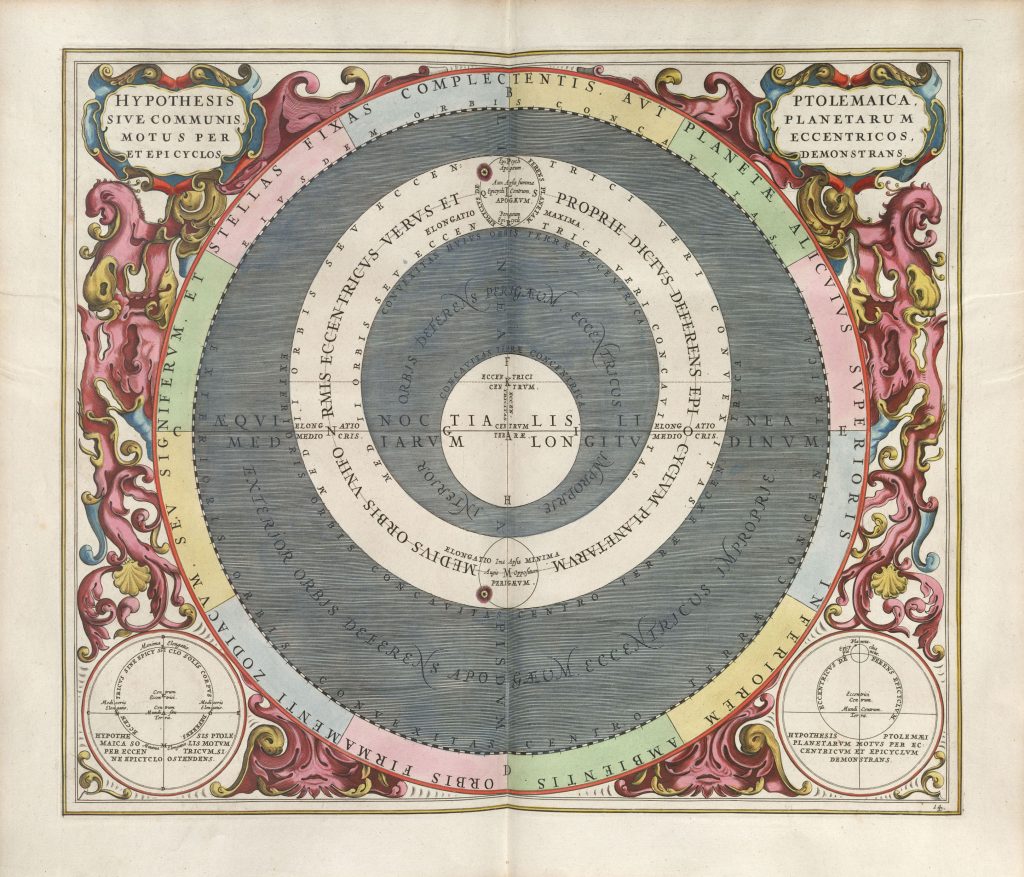
Bias Pious
To be “pious” in the realm of science is to be the opposite of biased. However, this is often the trick of bias—to remain appearing as pious. The empirical sciences guarantee certainty by assuming that the “observation” of the element will disprove the “speculation” about it. This implies that everything is outside of thought, such that there is no such thing as self-thought independent of the extrapolation of what is brought into thought, i.e., the object of thought. In the empirical sense, thought is made into something outside the thinking about what is being perceived.
To be pious is to be free from bias, yet biased often portrays itself as pious. How can you differentiate between someone pious and someone biased? The answer is that you cannot, because they presuppose each other. To be pious is to be biased toward a certain way of being. A belief independent of rationalization, existing without thinking, seems to be the fairest for survival. However, the non-thinker is useless, and life is meaningless. Yet, to attain meaning, the thinker must take on suffering.
Empirical Problem
Empiricism fears that its most important value, i.e., infallibility, will be threatened if it dispenses with the principles of quantum. Such principles diverge from the ordinary formal logic constituting physics, and they lose the grounds for a verifiable system. But the answer to quantum is not found in empirical science; it is found in the science of ontology generally, which is foundational to empiricism, not the other way around.
Empirical science can only prove or disprove claims made from an ontological predisposition; otherwise, it has no basis on which its facts are grounded. The problem that quantum science is currently facing has been the foremost issue that the science of metaphysics has dealt with for the past few millennia. Metaphysics has always been accused of diverging from empirical and epistemological knowledge into the realm of mysticism. Accusations that reduce metaphysics to dogmatism are as misguided as the claim that quantum science is associated with mysticism. The reader is encouraged to treat the science of metaphysics as identical to the science of quantum mechanics.
———————————————
Opinion and fact
Just because something is an opinion does not make it true. An opinion ultimately strives to be true, but truth is not necessarily an opinion. An opinion may or may not be true because it can also be false, but truth, by definition, is the opposite of falsehood. Truth is therefore not merely opinion, but opinion is based on truth, or at least the attempt at truth or the deception of truth. In order for something to be an opinion, it must be guided by truth.
The question is: how do we produce a correct logical foundation?
Here, “logical” means not only structure but also truth, in the sense of being correct or incorrect. The idea of structure presupposes the aim that proportions are ordered in such a way that they are rational, meaning they can be conceived. There is a way to propose something that makes no sense, and therefore, it is not conceivable. The premises necessarily follow from the conclusion because whatever is involved in the conclusion must first be found in the premises, or at least be stated in the premises before it is concluded. Alternatively, the conclusion may convolute what is found in otherwise unrelated premises, bringing them together into the same premise.
Wrong questions
Are there wrong questions to ask?
Asking a question, by its nature, involves a contradiction because the answer is presupposed as something missing or partial. The problem is as follows: Is the answer already missing, and the question is a response, or does the asking of the question itself produce partial knowledge?
This introduces a limit to thinking. If questioning is the way by which a true fact is derived, a “complete answer” only points out the antinomies brought about by the question. Ironically, a complete answer can only point out the possible sides forming the contradictions of the answer. The comprehensiveness of a logical answer causes confusion, which must then be reduced to a limited answer to satisfy a particular presupposition implied in the question. What we recognize as an answer directly addressing the question is really a decision made to associate one antimony from the answer with one implication from the question.
The problem with hypothetical examples is that they beg the question by creating conditions that presuppose an answer implied from the beginning.
There is a common saying that goes something like, “There are no wrong questions to ask.” Science hastily appropriates this expression as a clause for satisfying curiosity and diversity of opinion. However, this inquest develops a “mess” of ideas and a “flawed” logical basis, while the opposite is required to filter the decoherence of presuppositions into a coherent system.
This does not mean that one should not ask questions, but one should be aware that the questions they ask might be wrong. The intent behind the question is what determines whether it is “right” or “wrong.” These expressions take on a moral tone because—right and wrong—in the intellectual domain do not escape their inherent ethical foundation.
Asking a question is a necessary early step in finding the right answers. However, there is no obvious, clear-cut division between questions and answers, where one is not logically implied by the other. The question becomes: What are we doing when we ask questions if the answer is already implied?
In the case of ontology, there are no wrong questions because a question is true in being a question, and a question cannot be denied in being asked.
A question is a wrong answer. Questions are wrong when their purpose is used to denote the order where a question is first posited, then an answer is hitherto found. A question presupposes an answer that is already implied from the beginning, so there cannot be an order where one is generated by virtue of the other. It must instead establish the kind of logic with which the answer arises naturally from the question, and the answer is simply the confirmation of what is already implied by the question.
Questions and answers are both premises of the same conclusion. In psychoanalytic terms, the answer makes conscious what is unconscious in the question. The answer, as present in the beginning, is very important in the science of ontology. If the question is asked without a correct logical basis, it will assume an answer that confirms an erroneous logic implied by the question. If we take the standard that alone asking a question brings about a correct answer, then what is outside this closed system—the implication or the reason for asking the question in the first place—is ruled out as a factor in the answer.
Methodological scepticism
This crude opinion obviously misses the question: how are concepts developed in the first place? Are they formulated first and then taught, like a product on the market, or is the very act of dialogue about the concept the process of its development—the actual bringing about of it?
Methodological skepticism is the first modern attempt to establish a beginning in metaphysics. However, methodological skepticism faces problems in demonstrating a foundation for thought. In the above example, if we ask: what comes first, thought or object?
This question assumes a foundational logic in which one principle can exist prior to the other. This implies that the predicate gives rise to a consequent that takes on an unrelated and independent nature.
In logic, when we say what “is” first, such as the number (1), we take the principle of “first” as applicable to both, which is the number two (2). For example, in mathematics, the number 1 is never merely a number among other numbers, because every number is fundamentally “one” number—in the sense that every number is 1 unit of quantity. This is why we have all numbers approach a limit of 1. For instance, 97, 98, 99, *100… 997, 998, 999, *1000, etc.
Listen to: Alan Watts—creative by nature.
How to Interpret
There is a scientific value of “fidelity” applied in the study of how to rightly interpret historical thinkers in their own context, rather than attributing modern understandings to their ideas and claiming them as original. This value is, of course, an ideal and is never fully practical. The very act of an idea going through a historical process changes the idea, such that it is only ever preserved as the ‘essence of an idea’ or the logical structure of it, rather than as an idea from some thinker during their time. For example, every thinker in history—even the recent ones—has unfinished or lost works, either because they were unable to finish them due to personal circumstances, or because the very process of their work passing through time filters out or alters aspects of their work, making it incomplete or inconclusive.
The reality is that the incompletion of the work is a direct result of the thinker reaching the peak of human thought at that time in intellectual evolution. The philosopher represents the peak of reasoning during their historical period. When we reference Aristotle, for instance, we are referencing the peak development of the Ancient Greek era, which he helped characterize. In other words, every thinker after Aristotle marks the beginning of a new and different era. After Aristotle, philosophy shifted away from Ancient Greece, marking the end of that era and transitioning into the Neoplatonism of the early Roman Empire. Similarly, when we reference Hegel, we are pointing to the “peak” and “end” of the modern philosophical tradition, which led into the early modern scientific tradition of Einstein and eventually into the collapse of modern science with the postmodern tradition.
Academic Infidelity
Fidelity is a valuable principle in the early stages of philosophical education because it requires the student to tame their loose and unstructured free thinking, gradually honing it with the proper logical structures demonstrated by the great thinkers of antiquity. However, as one advances in philosophical learning, “fidelity” becomes a hindrance, an impediment to the free thinking necessary to break new ground in rationality.
By “free thinking,” I mean that at some point in their practice, a philosopher must take control of their own thoughts and structure them into a system that they intuitively and naturally conceive within themselves, with the aid of references to past established ideas. A true thinker does not merely mimic or “analyze” other ideas; they develop them in new ways. Most academics are stuck in the scholastic tradition of interpreting and preserving past ideas. However, the preservation of these ideas has already, on some level, been maintained in the unconscious mind of humanity. The purpose of consciousness is to change them.
Intellectual dead-ends
They find comfort in avoiding the reality of their own daily lives by getting stuck in the endless research of other people’s thoughts, without ever developing any sense of their own reason. Reason is something you develop consciousness of, and classical ideas can help with that. However, instead of aiding this development, they are often used as a comforting place to avoid self-conscious reasoning.
Modern society has placed a limit on the individual mind by not only attacking their consciousness but also their self-consciousness—the consciousness of the self. They have misplaced the idea of the “self” onto the innovative and present moment the observer is in direct perception of. We are always looking at a screen; it is always immediate for you. In academia, a variant of this is the root of all social conditioning, which simulates “thought” for the reader by making them concerned with the thoughts of others. There is nothing inherently wrong with studying the thoughts of historical figures, but the point is to take those thoughts and apply them to self-thought—what the observer experiences in their own mind. Academics sever the relationship by dividing what you learn from other thinkers as truth, while your own thought, by virtue of not living up to previous thinkers, is seen as flawed, unreliable, and lacking.
The other extreme is the Buddhist approach, where knowledge or “awakening” is achieved purely by being conscious of the immediate moment, without any reference to academic sources. This is knowledge in a non-scientific sense because it is a practice, and therefore, a moral knowledge. They do not communicate their truth within a universal system; instead, they derive the truth solely subjectively, through methods like meditation.
Even though they observe the “universal,” they fail to transfer it objectively, leaving it as a subjective and personal experience. The opposite extreme is contemporary academia, which conditions the student to only “talk” about the truth but never achieve awakening, disabling them from acting on it. They become fixated on locating the “truth” in the works and writings of past figures, but end up becoming nothing more than announcers on the topic, ultimately veering into crude dogmatism. All the knowledge that needs to be “known” is already present in the unconscious parts of the mind. The philosopher’s role is to take the ideas that have been made conscious throughout history and connect them with their own unconscious thoughts that require elucidation.
Alan Watts says that truth derived from another person is no different than “someone stealing your watch and selling it back to you.” The philosopher ought to “capture” the thought naturally as it eases into the mind, much like taking a picture of an idea and transforming it into a product that can be shared and consumed by others. Once I capture my “ideas,” they become “real,” objects that can be transferred.
Commencing into Metaphysics
Many disdain metaphysics because they do not want to commit a misunderstanding, which is often considered the worst scenario for the scientific thinker. However, having made this preliminary point, the individual can stray from the truth in either direction.
The term “metaphysics” is not the inquiry that investigates the nature beyond the physical. Aristotle uses the etymology of the term “meta” to denote a position “after” or “beyond,” simply to structure a body of knowledge with a “first science.” The first philosophy begins with thought and moves on to the nature of matter. As a result, a misconception arises that questioning the nature of matter is confused with excluding it from being, when in fact, introducing indeterminacy into matter characterizes one of its primary states. It is true that matter is subordinate to thought, but what this might mean is very different from saying that matter is secondary. The claim that matter does not exist because it involves a supporting role for thought is not only inaccurate but also dishonest. The question concerns what matter is—not only as exhibited for the senses, but also as a principle of thought. It is in this way that matter is predicated by reason.
The ordinary account of mind is reversed because, instead of seeing the ego as the subject of the mind, the mind is viewed as the subject of the ego. In other words, our personal life experience is the product being observed and examined by the mind, not as we might think of the mind as a tool we use to enhance the expression of our self.
The law of general gravitation has proposed the truth in a reversed manner, which, ironically, is what appears natural to perception. To be partially true means there is truth in them, but that does not mean they are entirely true. General gravitation is untrue not because it is entirely false, but because it is incomplete and therefore misguided in attributing the source of gravity to something other than the actual source. It recognizes that gravity is a relation, and in that sense, it is true. However, the way it describes this relation is false because the relation between the two observed objects is an abstraction from a third, unobserved source: spacetime. Spacetime is a continuity that has a difference within itself, and this difference is identified as the relation between the two objects.